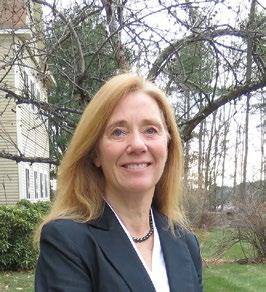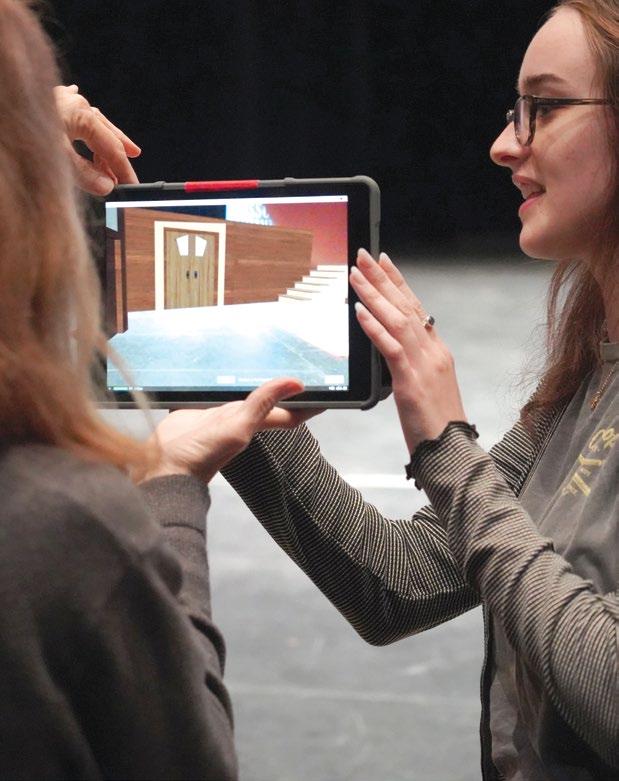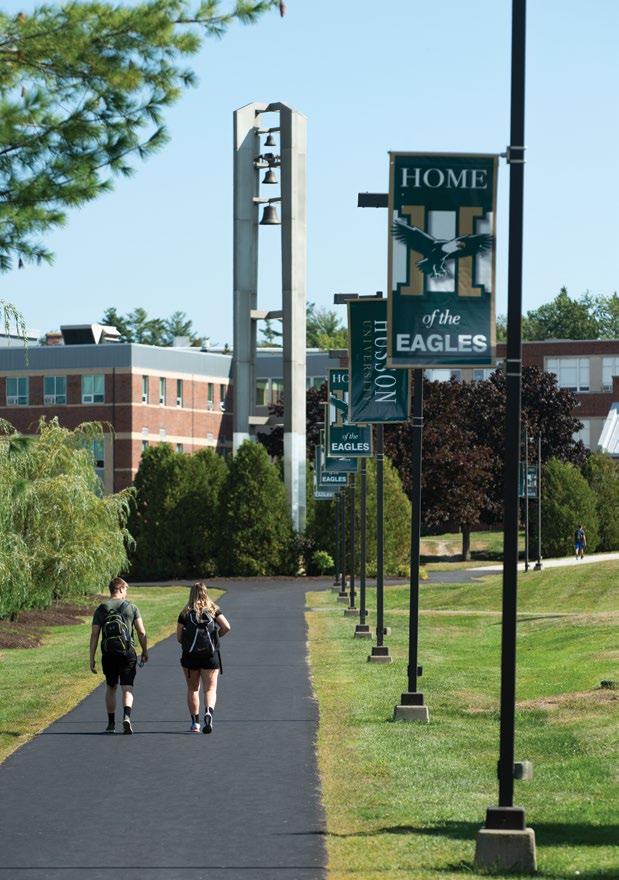












This special edition of the Ledger brings an enormous sense of satisfaction to all of us at Husson University. Because of the generosity of our alumni and friends, Husson University has officially and successfully concluded the first comprehensive campaign in our history. What does this mean for our students?
The campaign has made new faculty and facilities possible. This includes our first endowed professorship, new laboratories, technology, programs, athletic facilities and academic learning spaces.
Through the power of philanthropy, we have established 51 new endowed scholarships. Each helps to keep
a Husson University education affordable for deserving students.
We have met the Alfond Foundation Challenge for the new College of Business building. In total, we have raised nearly $15.2 million toward the anticipated $17.2 million cost for the project. We’ll break ground on April 20, 2020 on this new state-of-theart building.
The most remarkable aspect of the campaign experience is the generosity of our Husson family. Even after giving, I received inquiries from alumni interested in doing more to help support the University.
There are ample opportunities beyond philanthropy. Share Husson’s story and reputation with others. Your voice, when added to ours, can make a difference. Husson’s tuition and fees are the lowest of any private four-year institution in all of New England. We offer a quality professional education
at an affordable price. The enclosed insert provides students referred to us by alumni with application fee waivers. Share it and let us know if you need more!
Let potential students know that 96 percent of our graduates are employed or in graduate school one year after graduation. If you’re an employer, open your business to our students through internships or hire a Husson graduate. You won’t be sorry.
We deeply appreciate everyone who helped support our campaign. We look forward to the future you helped create and thank you for making this journey with us. Together, you and Husson are “Shaping our Future.” WE DID IT!
Thankfully, Robert A. Clark, PhD, CFA President
Because of you, we have succeeded in raising a total of $37,988,400. Students are receiving more scholarship aid.
Husson’s College of Business will have a signature facility, affording new opportunities for our students. Overall, the University is better prepared to meet the challenging demands of transforming student lives.
We owe a debt of gratitude to the many students, faculty, staff, alumni, friends, companies, and foundations who contributed to our campaign. There are thousands of worthy causes, and we’re honored by their choice to support Husson.
Over the course of the campaign, we received 5,746 individual gifts. I’m often asked if small gifts matter. They do. Without small gifts, we couldn’t have raised nearly $38 million and demonstrated the collective power of our Husson University community.
Finally, this campaign was a success because Husson University is dedicated to serving the needs of current and future generations. Each and every day, our faculty and staff live the mission of Husson and it shows in our success.
I want to thank President Clark, University leadership, and our trustees for their foresight in undertaking this ambitious campaign. The campaign committee led by tri-chairs Ed Darling, Tom Sawyer and Alice Trott propelled the campaign to early successes that
allowed us to ultimately exceed our goal and construct a new College of Business building. Finally, I want to thank and recognize the entire Advancement team. They work hard every day to build a strong network of alumni and friends who are engaged, excited and enthusiastic about all Husson has to offer to our students and our graduates.
Working together, we all succeed.
Best regards,

 Sarah Cary Robinson Vice President for Advancement
Sarah Cary Robinson Vice President for Advancement
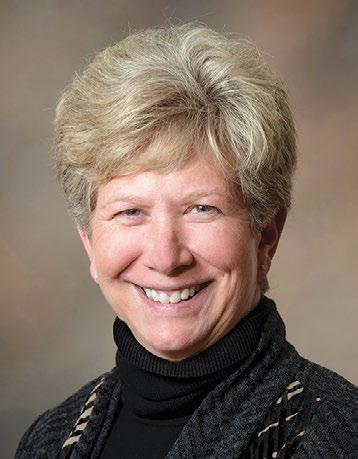

After decades of dreaming, years of planning and months of meetings, Maine’s largest business college is about to enter a new era of education with a building to call its own. Husson University’s College of Business hopes to welcome students in the fall of 2021 The classrooms, offices and labs that make up the accounting; business and management; hospitality, sport and tourism management; and legal studies schools will all come together in a 42,500 -square-foot, two story signature structure.
“It is humbling to see the numbers of individuals – staff, faculty, community partners and alumni who caught the vision and supported the project," says Dr. Robert Clark, president of Husson University. "It clearly highlights the spirit of a University that is mindful of the importance of its mission to transform students’ lives and prepare them for their professional lives. It also clearly represents Husson’s growing strength and stature as an institution moving forward."
“The College of Business faculty, staff and students are thrilled that we are close to starting construction of the new facility,” says College of Business Dean Marie Hansen. “The vision for the design of this building was a team effort based on research of the best futuristic learning spaces. We believe the students will be excited to have their own identity in this new location on campus reflecting that Husson has the largest College of Business in the state.”
“The idea of having a modern, up-todate space will improve our ability to deliver a quality education to our students” says Sarah Cary Robinson, vice president for advancement. “It will allow us to better prepare the students for their careers and their lives.”
“ I think it’s going to inspire the academic community, I think it’s going to impress potential employers, and I think the students are going to come to realize that this is a pretty special place.”
—Phil Harriman ’77
Fundraising for the new building started five years ago as part of the Shaping our Future Campaign. In April of 2017, the Harold Alfond Foundation challenged Husson University to raise $8 million in a little more than two years. In return, the Alfond Foundation would match it with $4 million. This past December, Husson successfully surpassed that goal. The Alfond Foundation donation represents the largest single gift in Husson University’s history.
"It is inspirational to recognize the engagement of our broader community of faculty, staff, community partners and alumni in their support of our vision of the future College of Business building," says Dr. Clark. "The real inspiration for me in the building is the people that bring it to life – the faculty and staff that educate our students and challenge them as they prepare for their professional lives."
An enclosed glass walkway will connect the College of Business building with the Richard E. Dyke Center for Family Business. For Dick Dyke ’58, ’76H, the donor for the Dyke Center, the new building represents the full circle that One College Circle has made since he joined the Board of Trustees in 1965

Dyke had already made a name for himself buying distressed companies then turning them around to make a profit. According to Dyke, President Husson made a personal plea to him for help with the school. As part of his first order of business as chair of the Board of Trustees in 1973, Dyke decided to spruce up the campus and strike up the spirit of the faculty and staff. He called for a mandatory meeting in the gymnasium to talk about plans for a college cleanup day. “I’d been up for a lot of hours,” explains Dyke. “After making the announcement, I fainted right there on the gymnasium floor. As somebody helped me to stand back up, I looked at the audience and said– there, that’s my commitment, what’s yours? The crowd went wild and everyone showed up the next day to get to work.”
Dyke also travelled to Washington where he convinced the U.S. Department of Housing and Urban Development to erase a $9 million loan. “I promised them that we would bring fiscal responsibility to the campus,” says Dyke, “and that they’d be very proud that they forgave us. If those same people saw Husson now they would know they made the right choice.”
Phil Harriman ’77 remembers those tough times at Husson as a student while Dyke was board chair. “The Post-Vietnam War era had created a vacuum of students leaving the college because they didn’t have to worry about the draft anymore,” explains Harriman. “I was concerned for several years after I graduated that I might have earned a degree from a university that would no longer exist.”
He credits Dyke, Bangor Savings Bank and others for pulling Husson through.
“I am now a very proud alumnus of Husson University,” says Harriman, a former Maine state senator who serves on the Husson Board of Trustees. “I’ve seen the passion and the thoughtfulness that go into developing curriculum. If I’m not willing to put my dollars on the table to support what Husson enabled me to achieve, then we’re going to become just like any other institution that’s more interested in quantity than quality.”
“If you’re lucky enough to do as well as I’ve done, and you don’t give back to your community, what kind of person are you when you finally go?” says Dyke. “Everybody has worked so hard to see this be built.”
“I think it’s going to inspire the academic community, I think it’s going to impress potential employers,” says Harriman, “and I think the students are going to come to realize that this is a pretty special place.”
That forward thinking is why Harriman, Dyke and numerous other Husson graduates donated generously to the new College of Business building. “Husson has been well known in Maine as a premier business school,” says Ed Darling ’64, President and CEO of Downeast Toyota. “By adding the College of Business building, we will extend our reach thoughtout New England. We will be
known as ‘the Wharton Business School’ of the Northeast.”
Darling, his wife Mary Ellen and their good friends, Joe and Sue Cyr, took leading roles in making sure the COB campaign succeeded. Both men currently serve on the Board of Trustees—Darling since 2005 and Cyr since 1992. They each started with a gift of $500,000, including a challenge by Darling to fellow Board members to match his gift. They did. Then Darling and Cyr both gave again at the end of last year to celebrate the completion of the Alfond Challenge and to lessen the gap between what has been raised and the total cost of the building. Currently, $15 2 million has been raised for the anticipated $17.2 million cost of the building. The additional funding will come from existing board reserves.
“The good Lord, the Bangor-Brewer community and Husson University have been very good to us over the last 50 years and we feel it’s our responsibility to give back,” explains Darling.
“We didn’t want to just meet the Alfond Foundation challenge, we wanted to surpass it,” adds Cyr, owner of John T. Cyr & Sons transportation company. “I sit at those board meetings and I’m so darn proud of what Husson has become. It makes me want to help keep it going.”
Both men hope that before the building reaches completion, the additional $2 million will be raised so that the building will be 100% funded from charitable donations.
Royce Cross ’14H fondly remembers his dad telling him stories about Chesley Husson. “My dad [Woodrow Cross, Sr.] attended the Maine School of Commerce back in the 30s,” explains Cross. “I have had people tell me that he’s the only living person that sat in class with The Chief.”
In fact, Woodrow Cross was attending classes in downtown Bangor the day the infamous Brady Gang came to town. Woodrow’s son and Royce’s brother, Brent Cross would also graduate from Husson. He went on to teach classes at the school and was a member of the Husson Board of Trustees when he passed away in 2015
Royce Cross began working for the Cross Insurance agency back in 1970. “I always remember my father saying ‘Chesley Husson taught me this’ or ‘I learned that from him.’ He really depended on that advice,” says the current President and CEO of Cross Insurance.
Cross sees his contribution to the College of Business campaign as a critical tool in the survival of local businesses, including his. “Husson is picking up our research, development and training,” Cross explains. “We can afford to do some of it, but we can’t pay for all of it. Husson teaches practical skills that we can directly apply to our workforce here at the Cross Agency.”
Husson University has received three George I. Alden Trust grants over the years. The latest came last year and went toward the construction of the new College of Business Building. The Foundation is based in Worcester, Massachusetts. “Given the role Husson plays in postsecondary education in the Bangor region and in Maine more generally, the Trustees are pleased to have been of assistance to Husson on these projects,” says Doug Meystre, one of the four Trustees. “With
regards to the most recent College of Business (COB) grant, President Clark made a very convincing case that the project was of critical importance to Husson, and the Trustees were impressed by President Clark’s personal financial commitment toward its success.”
In June of last year, the Bangor Savings Bank Foundation committed $500,000 to the COB campaign. The funding will come during the next five-year period. About 40% of the student population at Husson are in the College of Business. “We graduate more than 50% of the MBAs in the state – more than double the University of Maine and Southern Maine combined,” says Robinson.
“During my almost 15 years as a faculty member at Husson, I’ve always found it curious and a little bit humorous that the College of Business, which to this day houses more students than any other school or college on campus, is physically relegated to a more or less single hallway of faculty offices in Peabody Hall,” says Bobby Duron, Director of the Husson School of Accounting. “The new building will serve as a lasting and commanding physical representation of the important place that the College of Business has held historically and will continue to hold as we move forward into the next 100 plus years.”
“It’s pretty crazy to think that a building that’s been envisioned since before my time here at Husson will finally begin to take shape within the next few months,” says Elena Speronis, a sophomore
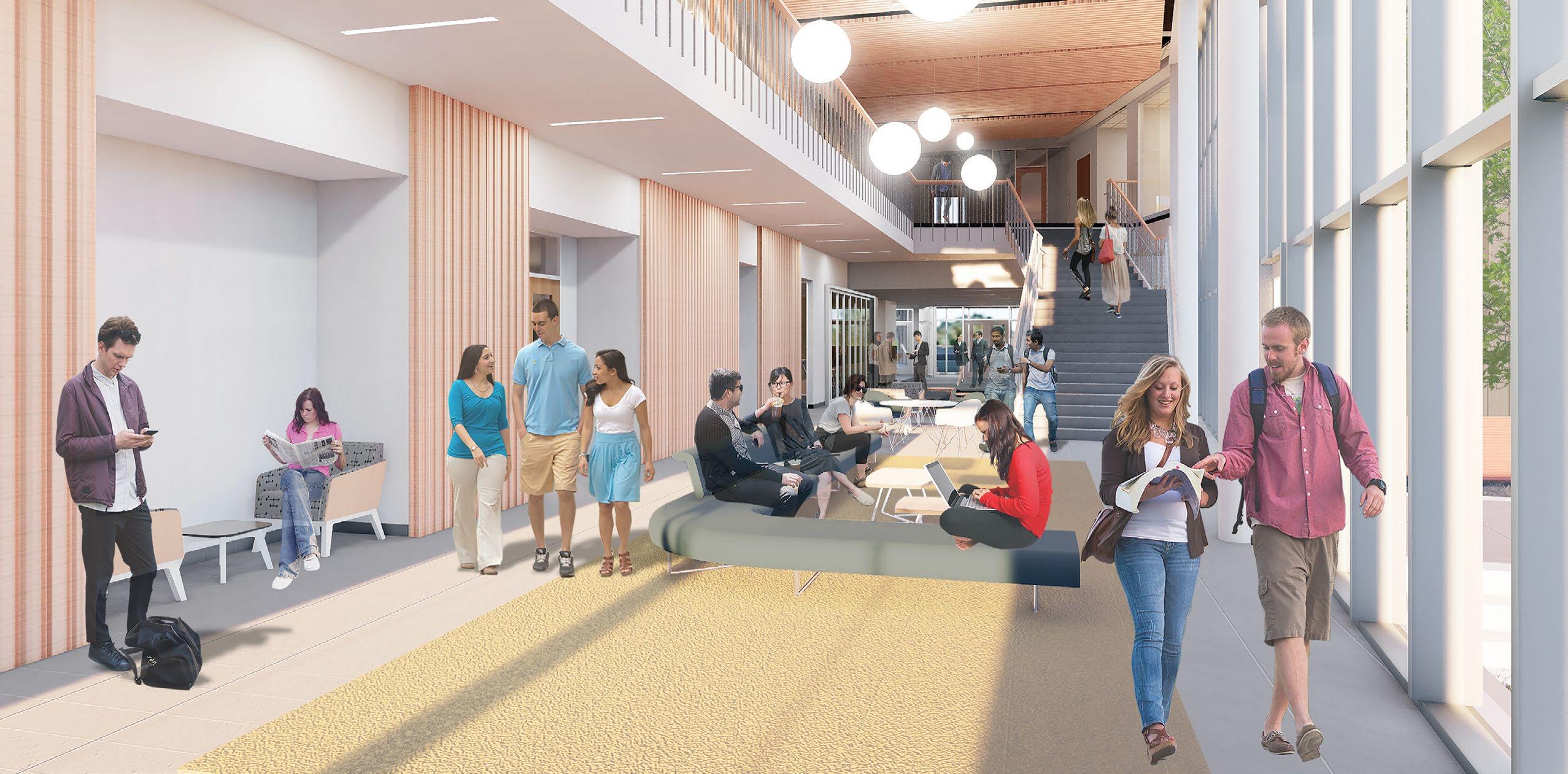
majoring in Hospitality and Tourism Management. “I feel as though this new building will help to give College of Business students a newfound home in which we can not only expand our intellectual horizons through classes and other experiences offered by the fresh space, but also a gathering place to come together and support one another as the new members of the greater Bangor business community. It will further cement the ties that Husson has made with the area, for the sake of its students’ experiential enrichment.”
“Faculty will be able to engage new pedagogical tools that include even more experiential learning options such as in the Ronan Center for Financial Technology 360 -degree classroom, the IEX (Interactive Experience) Center, specialized classrooms such as the criminal justice simulation lab, and interactive workspaces,” explains Hansen. “The open spaces throughout the hub of the building as well as tutoring space and study rooms will allow for students to interact and learn in comfortable environments.”
Faculty offices will be grouped into four “neighborhoods” representing each of the four schools. “The new building which includes more ’student space’ will allow for greater interaction between students and faculty,” says John Michaud, Director and Assistant Professor of the School of Legal Studies. “I believe that the new building will significantly help with recruiting more students to the College of Business and its four schools.”
“ Given the role Husson plays in post-secondary education in the Bangor region and in Maine more generally, the Trustees are pleased to have been of assistance to Husson on these projects,”
—Doug Meystre, Trustee, George I. Alden Trust
Dr. Tom Fitzpatrick, director of the School of Business and Management, agrees.
“The new COB building represents an investment in the future for our students by Husson Trustees and administration,” he says. “Our students will be taught in the most modern college of business building in Maine and New England. For the students and faculty, it will mean having the most modern technology and tools available to elevate our teaching and learning environment. This is the kind of strategic investment that will pay dividends for decades to come.”
The school’s Interactive Experience (IEX) Center is a focal point of that forward thinking. “It will create immersive and interactive experiences like virtual and augmented reality, across a wide variety of Husson courses,” explains Brave Williams, MFA, assistant professor at the New England School of Communications. “The Center will also serve as a resource to local businesses who need assistance in integration and development of immersion technology.”
“This building will allow students to combine academic learning with experiential learning through simulations and direct connectivity with real-time workplace activities,” adds Lee Speronis, director and associate professor, School of Hospitality, Sport and Tourism Management.
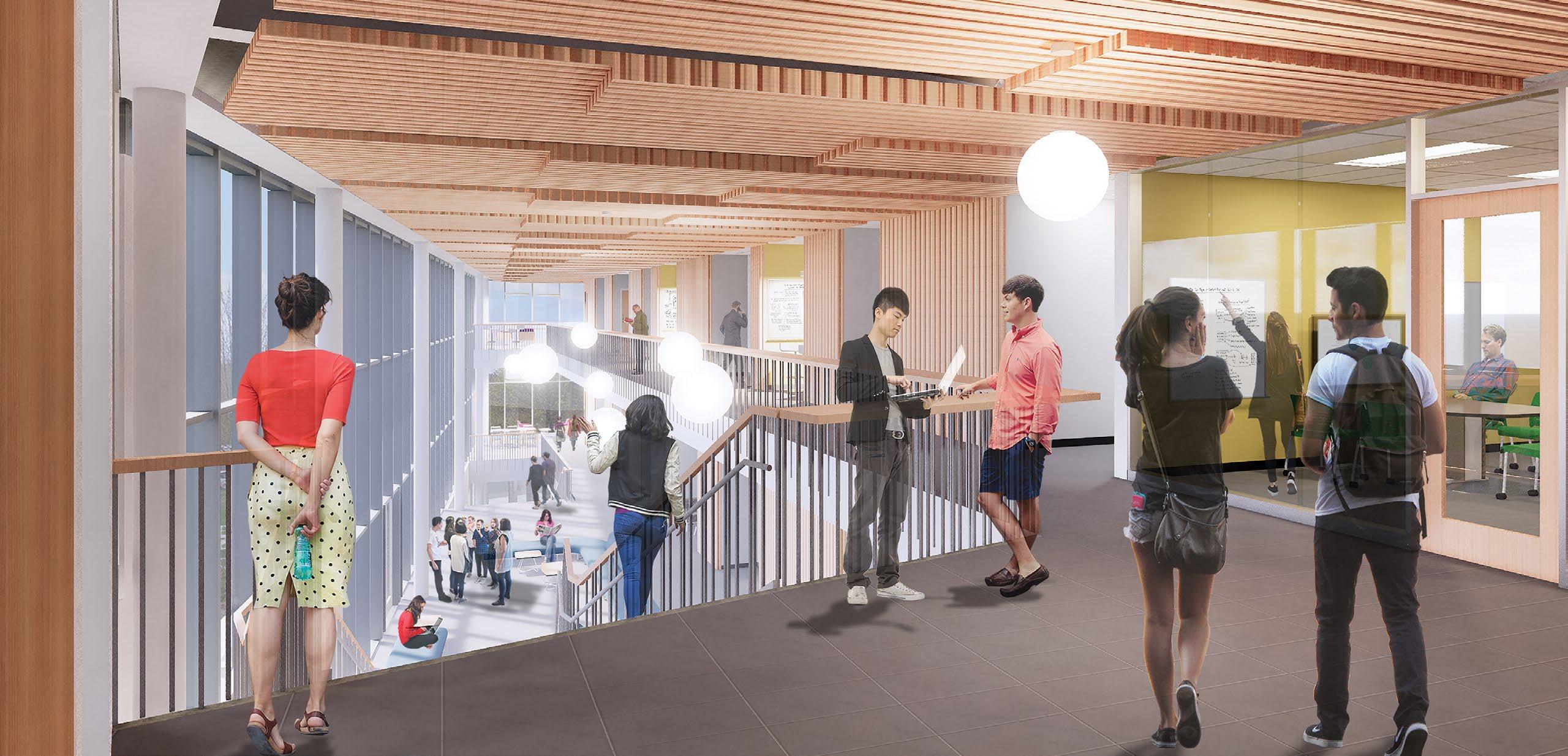
“Husson has come a long way with all the renovations that have taken place since I arrived back in 2015,” says Ali Kennedy, a fifth-year student pursing her MBA. “The Darling Learning Center has been
able to offer students the 360-learning environment, but what I really think Husson University lacks is a space for business students to really call their own. The new College of Business building will be able to bring like-minded individuals into one building and is only going to improve the way that business students can learn and grow as professionals.”
“I feel that in order for a university to keep growing, you have to keep expanding,” says Cheryl Noyes. Husson University sits on land once owned by her great grandparents. She and her sister, Gale Longo are co-owners of Grant Realty Corporation. Their father ran several successful business in Bangor including the Kev-Lan restaurant and convenience store near campus. Both women wanted to contribute to the construction of the COB building.
“My father was a self-made business man,” says Longo. “He always encouraged young people to go into business, and hopefully those that did, would stay here in Maine. Husson is drawing people from all over the country and beyond. I’m hopeful this new building will lure even more students.”
Jim Dicke ’17H has been invited several times to speak with Husson business students about his experiences as chairman and CEO of Ohio-based Crown Equipment Corporation, a global manufacturer, distributor and service supporter for fork lifts and other material handling products. The family-owned firm has more than 14,000 employees and exceeds 500 dealers in more than
80 countries including the United States. In 2017, Dicke was Husson’s graduation commencement speaker where he received an honorary degree.
He was also one of the earliest as well as one of the final contributors to the COB Alfond Challenge. “We find ourselves today in a rapidly changing world,” says Dicke,” where the need for business literacy pervades our lives no matter what we are pursuing as a career. As an honorary alum, I am particularly pleased to support a wonderful place that I have come to admire. The dedication to quality teaching and the commitment to keeping higher education affordable was all very compelling when I considered supporting the campaign. I would like to add that President Clark and his team did a remarkable job of staying focused and persistent which is what was key to this monumental success. It is a tribute to the entire Husson community.”
“Husson’s real growth has come as it delivers on its promise to prepare professionals for tomorrow’s workplace,” said President Clark. “We celebrate the fact that many of our corporate donors committed to the project because they supported the great work Husson was doing in preparing their future employees.”
All students, faculty, staff, alumni and community members are invited to the Husson University campus for a College of Business groundbreaking ceremony on April 20th.
"
...The dedication to quality teaching and the commitment to keeping higher education affordable was all very compelling when I considered supporting the campaign."
—Jim Dicke ’17H Chairman and CEO of Crown Equipment Corporation
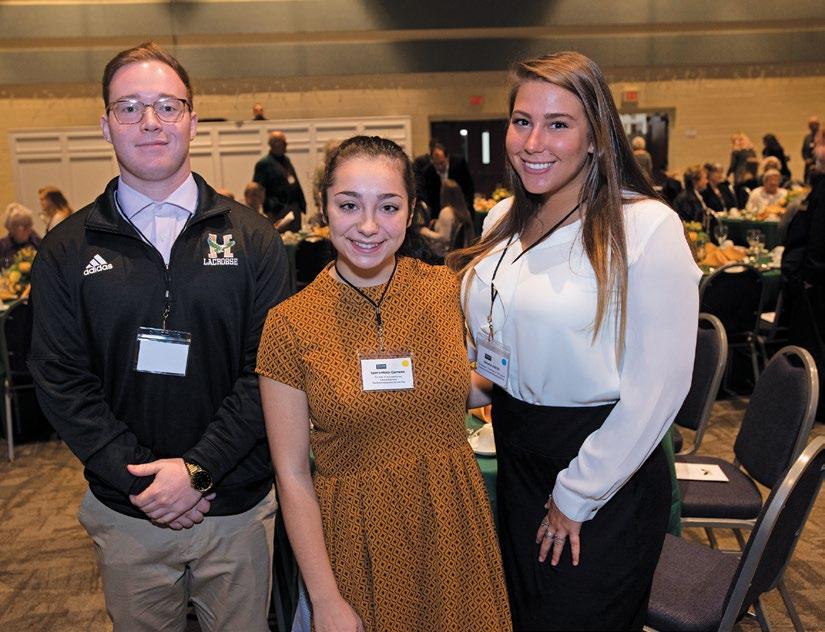
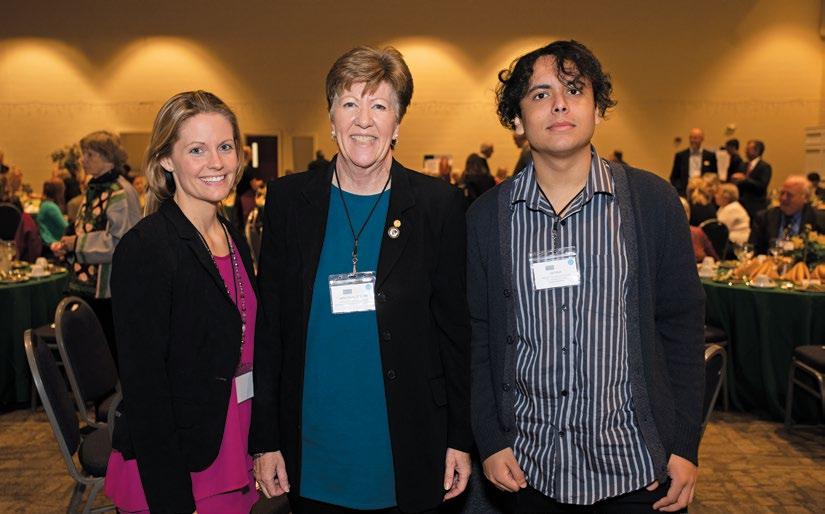

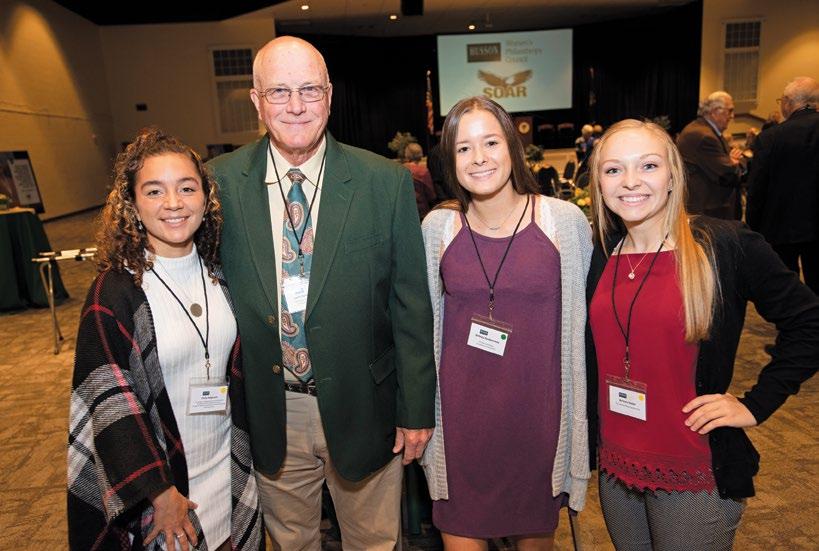
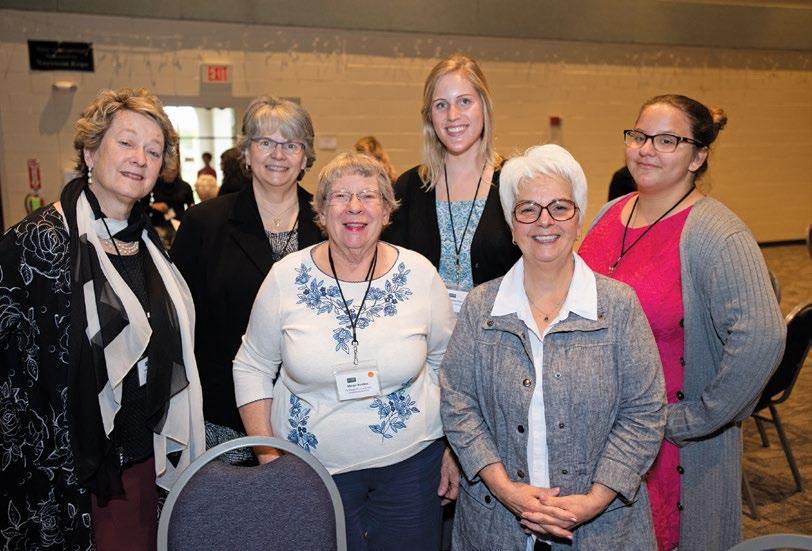
Instead, we’d like to see it get used while we’re still living,” says Joe.
In 1992, Cyr was elected to the Husson Board of Trustees, a position he still holds today. 1992 was also the year Cyr and Tom Thornton ’75 purchased Freightliner of Maine. Tom had worked as a bus driver for Joe’s company. The two men would go on to start other transportation businesses, many of which are still going today. When Thornton passed away in 2011, his wife and the Cyrs created the Thomas E. Thornton, Jr. ’75 Husson University Scholarship.
Joe & Sue Cyr ’65
Thomas E. Thornton, Jr. ’75 Husson University Scholarship
Rick ’65 and Linda Hersey Scholarship
Soon to be announced scholarship in memory of Stanley and Mary Peterson
Suzanne Cyr graduated from Husson College in 1965 with a secretarial degree. She worked in the legal field for a few years before being offered a prestigious job back at her alma mater. “I was President Husson’s secretary,” Sue states proudly.
While working for Chesley Husson, Sue was set up on a blind date with a young man named Joe Cyr. He too, had attended Husson College and even played on the men’s basketball team. But in the middle of Joe’s sophomore year, life changed course.
“My father’s business partner, which happened to be my cousin, passed away quite suddenly,” explains Cyr. “I had the opportunity to go work at Cyr Bus Lines in 1962.”
When Joe’s father passed away a few years later, he purchased the company. Today, John T. Cyr & Sons is a transportation industry leader. Their fleet includes 20 motor coaches, 200 school buses, and 30 other vehicles.
Joe and Sue married just five months after their first blind date. Together, the couple has made it their mission to give back to the community. “Sue and I have said there’s no sense in hanging on to our money until we’re gone.
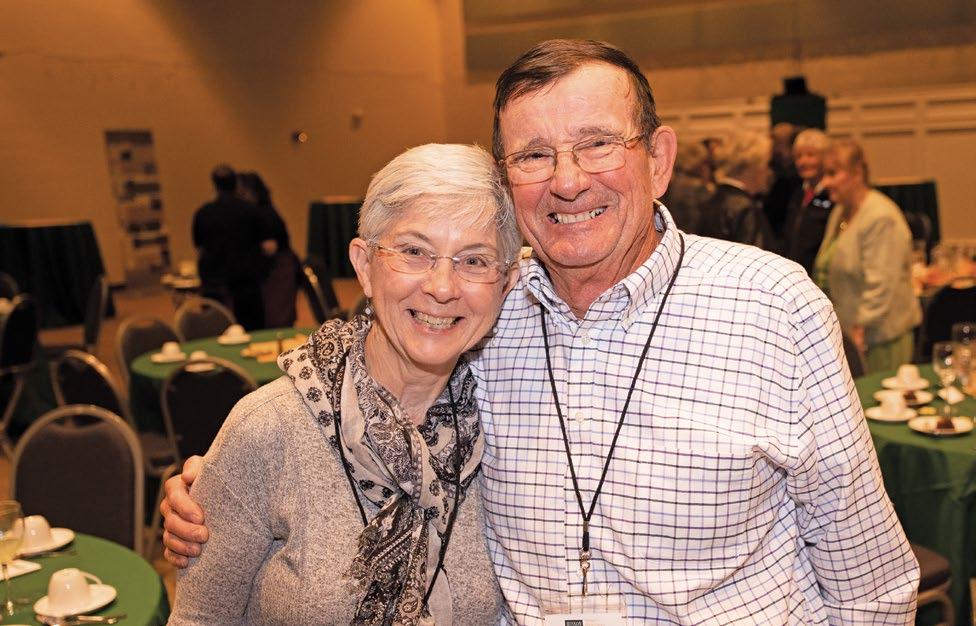
Five years later, Joe Cyr’s brotherin-law, Rick Hersey ’65 died. Rick’s pride in his Husson education and his long and successful career as a real estate broker in Massachusetts led to the creation of the Rick ’65 & Linda Hersey Scholarship. Students from the Hersey’s home state are given first priority for the scholarship followed by students from other New England states outside of Maine.
The Cyrs recently added a third scholarship in memory of Stanley ’42 and Mary Peterson. Stan, as he was known, passed away in 1985. His wife, Mary was the mother of Joe Cyr’s best friend. She died this past November.
“We need scholarships desperately,” says Cyr. “Husson is the lowest priced private college in New England, and that’s something that we’re very proud of. Scholarships go on forever, which is great.”
Sue Cyr is a member of the Husson University’s Women’s Philanthropy Council. Each year, the group brings together scholarship recipients with their donors at a luncheon. “We hear stories of how some of these kids just don’t have the ability to go to college unless people like us and others, contribute,” says Sue.
“Meeting the recipients of your scholarships, makes you enthusiastic,” adds her husband. “It’s amazing really. It makes you want to give, when you can give.”
Alan Baker attended college on a scholarship. Nearly 70 years later, he is still well aware of the value in that gift. “I was able to attend Bowdoin College because of that scholarship,” Baker says. “I only needed to borrow some money my senior year.”
Baker went on to lead a successful career in media and marketing in Philadelphia and New York. He decided to return to his Maine roots in the early 80s, starting National Media Services in Orrington. He also served in the Maine House of Representatives.
In 1986, Baker joined The Ellsworth American. Named publisher in 1989, Baker purchased the paper two years later, and started the Mount Desert Islander in 2001
Baker’s connection to Husson came in the early 70s when he was president of proprietary business schools in Boston, Rhode Island, New York and New Jersey. “I had a casual introduction to Chesley Husson,” explains Baker.
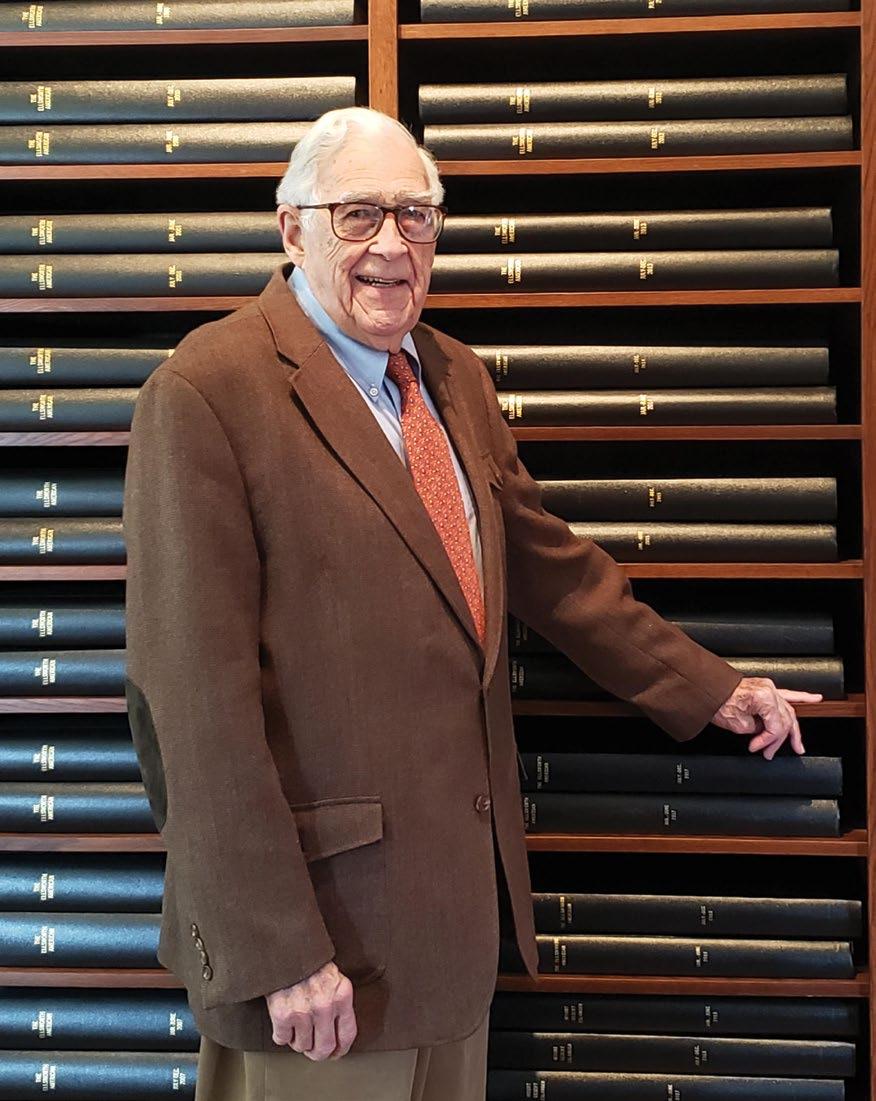
In particular, he was interested in Husson’s vision to change the school to a non-profit institution and then move the campus to its current location off Broadway. “I became a great admirer of what he was accomplishing,” says Baker.
When Baker moved back to Maine, he became acquainted with then Husson College Presidents Delmont Merrill and Bill Beardsley. “As a result, I continued to be interested in the school,” Baker explains.
He had already established a scholarship at his alma mater but was “determined” to also set up a fund for Husson students. The Bakers of Orrington Husson University Scholarship Fund was established in 2017 shortly before Baker retired from the newspaper industry. “I’m the last of the Bakers in Orrington,” he explained. “I thought this would be an appropriate way to keep our name alive.
The scholarship is intended for students from Hancock and Washington counties and the towns of Orrington and Holden.
Baker admires that Husson has kept their expenses under control. “They’re able to offer an education at a lower cost than most other colleges and universities here in Maine and in New England,” he says.
He also respects the direct connection between Husson graduates and the professional Maine community. “If one were to ask healthcare providers or business people here in eastern Maine, where did you get your training? Many, many of them answer, I went to Husson,” says Baker. “It’s fascinating how many Maine people are being educated at Husson for positions where they can become immediately employed upon graduation. Husson is a very important contributor to the education system here in our state.”
The Donald ’68 and Claudette Cyr Husson University Scholarship
Donald and Claudette Cyr knew they wanted to help students in their hometown of Madawaska, Maine go to Husson University. “We don’t have any children of our own,” explains Donald, “so we wanted to do something for students that attend Husson.”
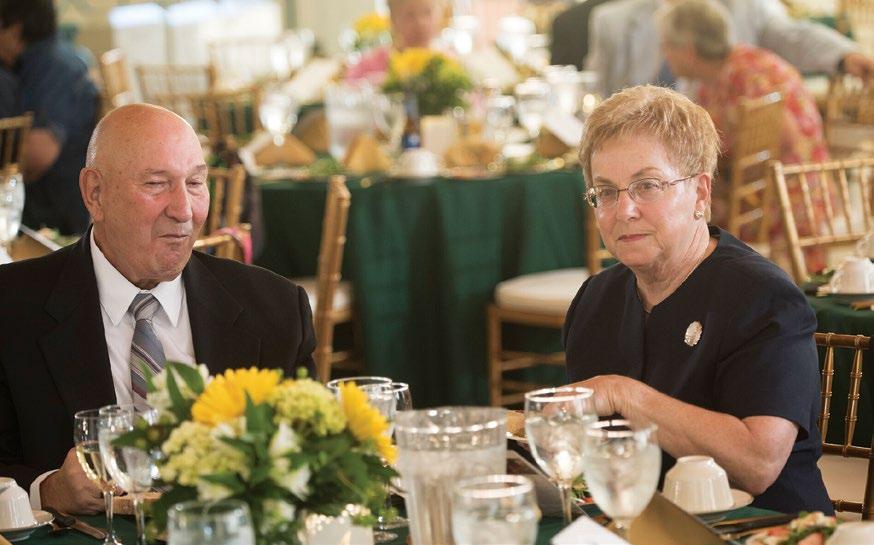
Donald graduated from the school in 1968 with a B.S. in Business Administration. “It really helped me in my career and I’m thankful for that,” he says.
Cyr is also thankful for the proctoring job he had while attending school. “It really helped me in meeting my expenses at Husson because it paid for room and board,” he says. “I appreciated that very much.”
The Cyrs started exploring scholarship opportunities available through Husson. The charitable gift annuity caught their attention. The couple decided to pledge $250,000 toward the Donald ’68 and Claudette Cyr Husson University Scholarship, which will activate when both of the Cyrs have passed. In the meantime, the couple receives a fixed income from that gift in the form of an annuity. “It’s worked out real good for us,” says Cyr.
The scholarship is intended for students from Madawaska that will attend Husson majoring in business administration or nursing. Claudette worked as a nurse and administrator in a nursing home facility in her native country of Canada. If there are no students eligible from Madawaska, the scholarship is extended to residents of Aroostook County and then the state of Maine. “We’re far from being rich people,” says Cyr, “we just want to share our luck.”
After establishing the charitable gift annuity scholarship, the Cyrs realized they wanted to do something more immediate. So last summer, the couple decided to commit an additional $1,000 annually toward a scholarship for a current student. “I would encourage anyone, not just Husson alumni, to participate in the scholarship program,” says Cyr. “Whatever help we can give students, it gives them a chance to be able to earn a decent living.”
Alan Baker The Bakers of Orrington Husson University Scholarship Fund“ We don’t have any children of our own, so we wanted to do something for students that attend Husson.”
Donald Cyr ’68
Tom W. Sawyer Business Scholarship
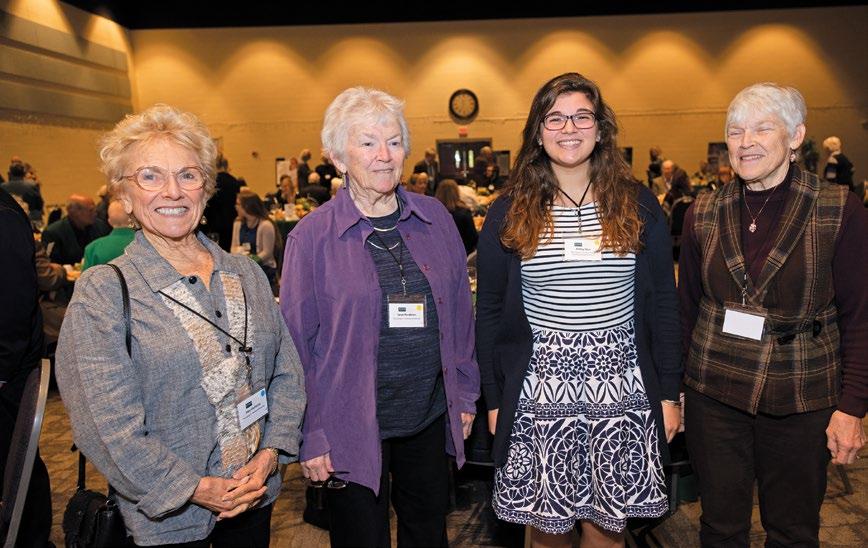
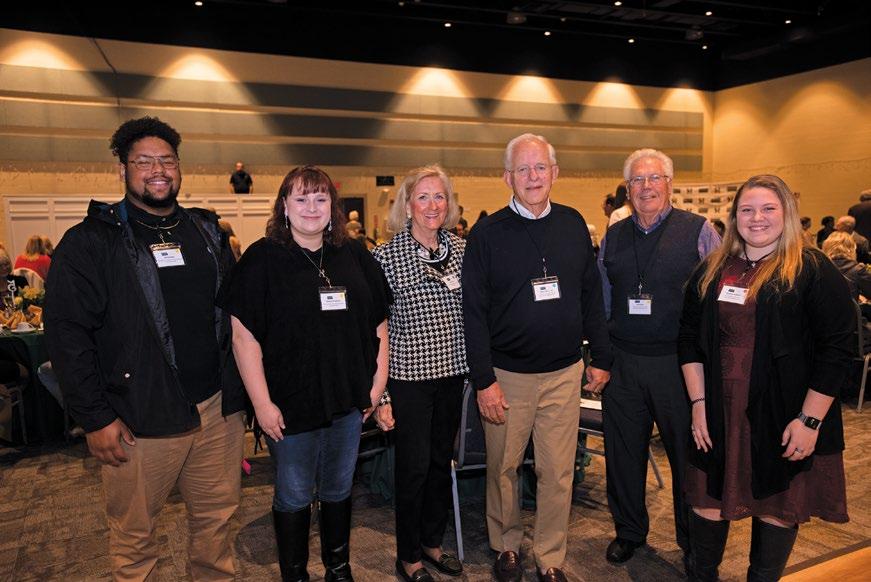
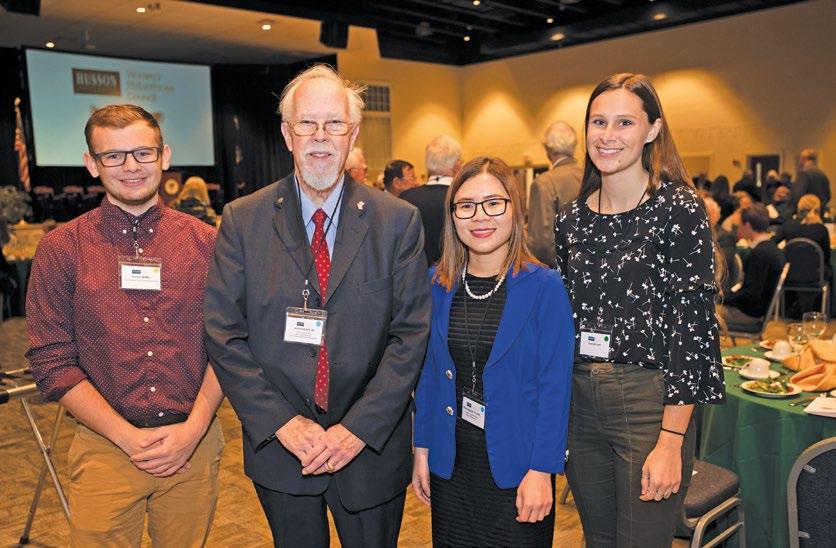
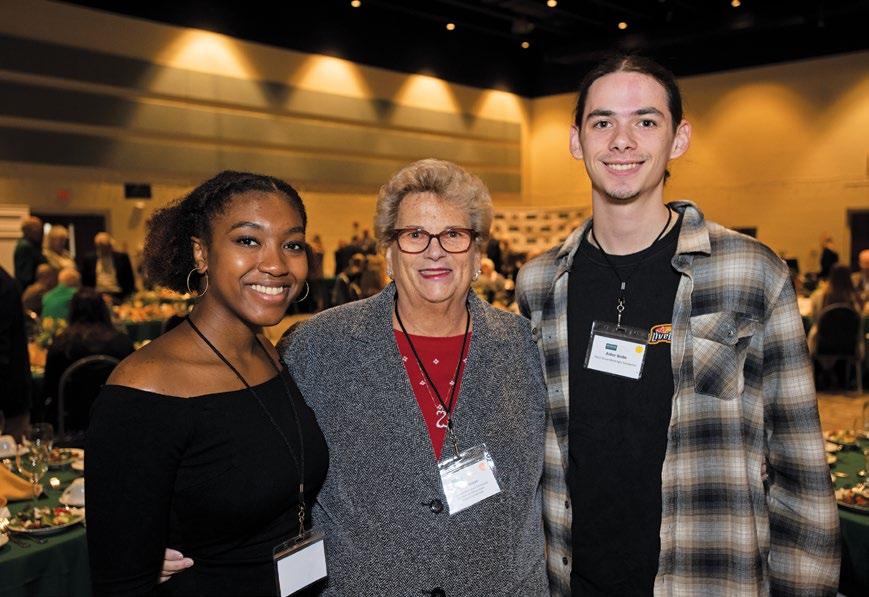
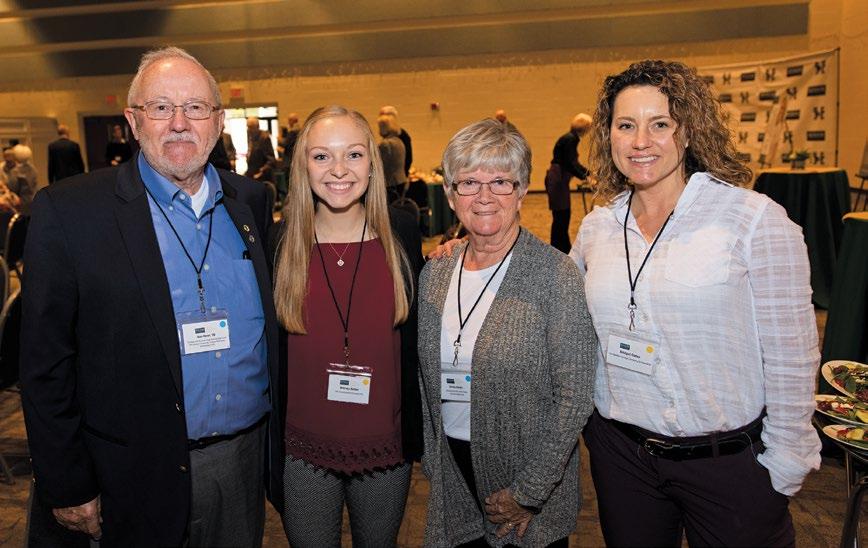
Bonnie P. Sawyer Nursing Scholarship
By his own admission, Tom Sawyer’s first experience with college didn’t go well. After three years at the University of Maine, “I had a 1 8 GPA,” he says. Then, Tom met and married Bonnie. She enrolled in the U.S. Army Nursing Corps to help pay for college. After graduating, Bonnie received her commission and was stationed at Fitzsimmons Army Hospital in Denver, Colorado.
While there, Tom completed his degree at Denver University. “Because of my grades, I lost a year but I ended up graduating cum laude. Thank you Bonnie!” he says.
Bonnie would use her GI bill to earn a master’s degree in nursing from Boston University. “There were no advanced degrees for nursing north of Boston back in 1980,” explains Bonnie, “so they brought up a program that used some of
Husson’s facilities. All of the faculty were flown in from Boston.”
Strong will and determination has worked well for both Sawyers. Tom went on to become a successful entrepreneur, owning the Sawyer Environmental Recovery Facility in Hampden, the Breakwater 1904 Inn in Bar Harbor, and the Southwest Harbor Boat Marina. Bonnie owned Classical Endeavors, a residential/historic construction company in Ellsworth.
Bonnie served three years of active duty at the Denver hospital, and an additional 12 years in the Army Reserve in Bangor. She retired with the rank of Major.
In 1987, Tom was approached by then chair Doug Brown to serve on the Husson Board of Trustees. “I had such respect for Doug,” says Tom, “and I had enjoyed hiring Husson graduates at my own businesses. For many years, Husson Trustee Emeritus Leo Loiselle ’63 was our accountant. And so, as they say, the rest is history.”

Philanthropy is a pillar of the Sawyer’s life work including the W. Tom and Bonnie

Sawyer Library at Husson. “Our intent is to provide financial support where the institution needs it, not necessarily where we think it should go,” explains Tom. Sawyer is a tri-chair of the $38 million Shaping our Future capital campaign. “We needed to lead by example to show the long lasting impact of scholarships,” he says.
That’s why the couple created two scholarships – the W. Tom Sawyer Business Scholarship and the Bonnie P. Sawyer Nursing Scholarship. Both are funded through a charitable remainder uni trust. “We dedicated $2 million from our trust for the benefit of Husson,” explains Tom. “We receive a percentage of the principle, paid to us on a quarterly basis. Upon the second of us to die, Husson becomes the remainder interest of that portion.”
“We have, through drive, effort and some good luck, been very blessed in this world,” says Bonnie. “Part of why we’re here is to try and leave the world in a better place than when we came.”
“ We have, through drive, effort and some good luck, been very blessed in this world....Part of why we’re here is to try and leave the world in a better place than when we came.”
Bonnie Sawyer
The Carlisle Family Husson University Scholarship
The Carlisle family has deep roots in Husson University, dating back to 1933 when George T. Carlisle helped to found the school in downtown Bangor. Carlisle was a co-founder of the Prentiss & Carlisle timberland management firm at the time, and was instrumental in the decision to build a business school on Park Street. The Carlisle Residential Hall on campus is named in his honor.
George was succeeded as president of the timberland management company by his son, George D. Carlisle, who was in turn succeeded by his son, David, who became president of the company in 1982 and remains as chairman of the board, a position he’s held since 2001. Currently the company is led by David’s son Ben, who serves on the Husson Board of Visitors.
David and his wife Susan continue to carry on the Carlisle family’s commitment to help Husson students thrive. In 1999, the couple established two scholarships –the George D. Carlisle and the David M. and Susan A. Carlisle Scholarship funds. In 2012, the two were merged to create the Carlisle Family Husson University Scholarship. It is awarded annually to one or more students from the Northern Penobscot County region.
“At Prentiss and Carlisle, we have had extremely good luck with the Husson students we have hired,” says David. “In fact, in recent years two of our top management positions – both
CFO and CEO – have been filled by Husson graduates!”
Susan has served as a board member of the Good Samaritan Agency, the Bangor Children’s Home/Hilltop School and the Maine Discovery Museum. She also served five terms on the Bangor School Committee and United Technologies Center. Since 2000, Susan has been a member of the Husson Board of Trustees, and in 2013 was inducted into the Husson Alumni Hall of Fame as an Honorary Alumna. She’s also part of the Husson Women’s Philanthropy Council.
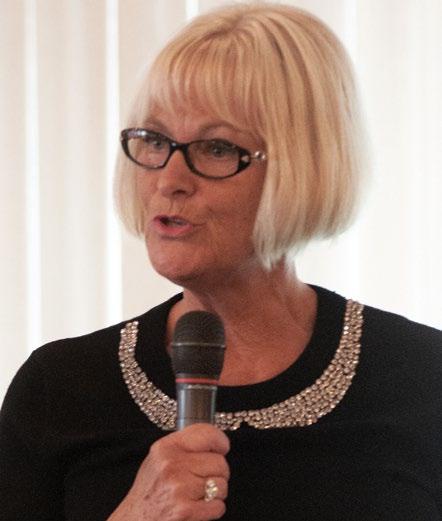
“We feel that Husson, with a history of educating first-generation students and ‘diamonds in the rough,’ has a really great story to tell,” say the Carlisles. “Its ’job-ready’ curriculum is extremely valuable to students who want to prepare for a profession and have a well-paying job directly after finishing. And having well-educated students, like those Husson provides, is good for the Bangor area, also.”
Cheryl
The Florence Hillman Grant Memorial Scholarship
Bud and Bette Grant Scholarship
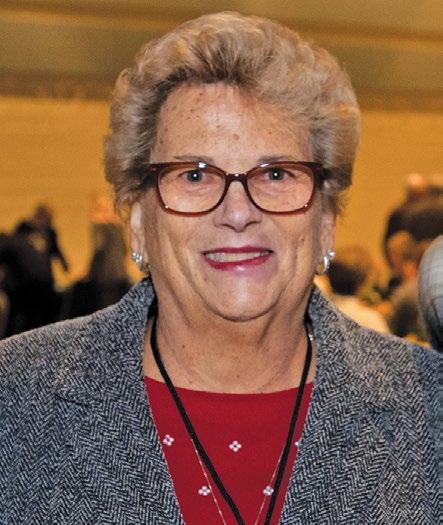
Gale Longo Scholarship
Growing up, Cheryl Noyes and her younger sister Gale Longo remember spending time at their great grandparent’s homestead off Broadway in Bangor. “It was Hillman Dairy then,” remembers Noyes. “It was at the end of a dead-end street off Broadway.”
The sisters’ great uncle took over the farm after their great grandmother passed away. On October 24th, 1956, Earle and
Adah Hillman sold their land to President Chesley Husson for what is now known as One College Circle. A framed copy of the deed sits in both sisters’ home offices, as co-owners of the Grant Realty Corporation.
The women’s father, Bud Grant, was a successful self-made businessman in Bangor. He owned Fairmount Terrace Motel, Queen City Mobile Home Park, Broadway Furniture, Birch Hill Estates Mobile Home Park and Kev-Lan on Broadway, which is now Dysart’s.
Noyes joined her father in running the convenience store and restaurant for the last 16 years. “We did a tremendous amount of business with Husson,” explains Noyes. “We had a room in the back which Husson used for luncheons and meetings.”
“He became very good friends with then President Bill Beardsley,” adds Longo. “It really was important for my dad to see Husson thrive.”
Neither Bud nor his wife Bette went to college. “My father was drafted into
the war when he was a junior in high school,” says Noyes. But both parents felt very strongly about educating Maine kids so they can stay and work in the state and they believed that Husson was the school to do that.
Noyes actually attended Husson in 1968, while construction of the new 208-acre campus on her great grandparent’s land was underway. “I was there the last year it was in downtown Bangor,” she says, adding with a chuckle “when your classrooms were kind of spread out all over creation.”
Noyes admits she didn’t like school at the time and dropped out after one year. “My mother was so mad at me,” she says, “because I had the privilege and opportunity to go to college while she and my dad couldn’t. I didn’t understand it at the time but I regret now that I never finished that degree.”
In 2005, Bud Grant created The Florence Hillman Grant Memorial Scholarship in memory of his mother. It is awarded to a full-time student who has graduated from a Maine high school in Penobscot,
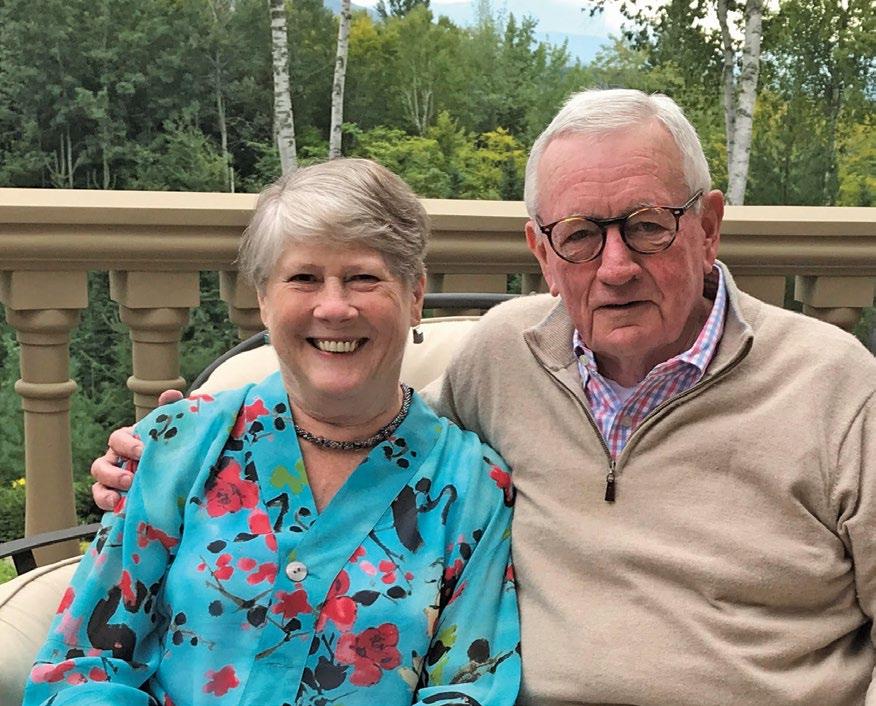
“Its ’job-ready’ curriculum is extremely valuable to students who want to prepare for a profession and have a well-paying job directly after finishing. And having well-educated students, like those Husson provides, is good for the Bangor area, also.”
Hancock, Aroostook, Piscataquis or Washington counties.
When Husson College transitioned to Husson University, Grant was given the first honorary degree with the new name on it. He passed away in 2010. Three years later, his wife established the Bud and Bette Grant Scholarship. Like the Florence Hillman Grant Scholarship, this too, is geared towards students living in the Augusta area north. “It just seems they have less opportunities than
those in the southern part of the state,” explains Noyes.
Noyes and her sister now maintain both scholarships. In addition, Longo established the Gale Longo Scholarship in 2012 after joining the Husson Women in Philanthropy Council. “I wanted every student to have the opportunity to go to school without the pressure of how to pay for it,” says Longo. “I also didn’t specify a certain grade point average. There are a lot of kids that are really trying and
they’ll go somewhere because they have such drive.”
The scholarships are renewed annually for each recipient as long as they continue their education at Husson University. “My sister and I have met with students who received our scholarships,” says Longo. “I give them a lot of credit because it can’t be easy to go to school and hold down a job. And most of them want to go on to pursue a masters or doctorate degree.”
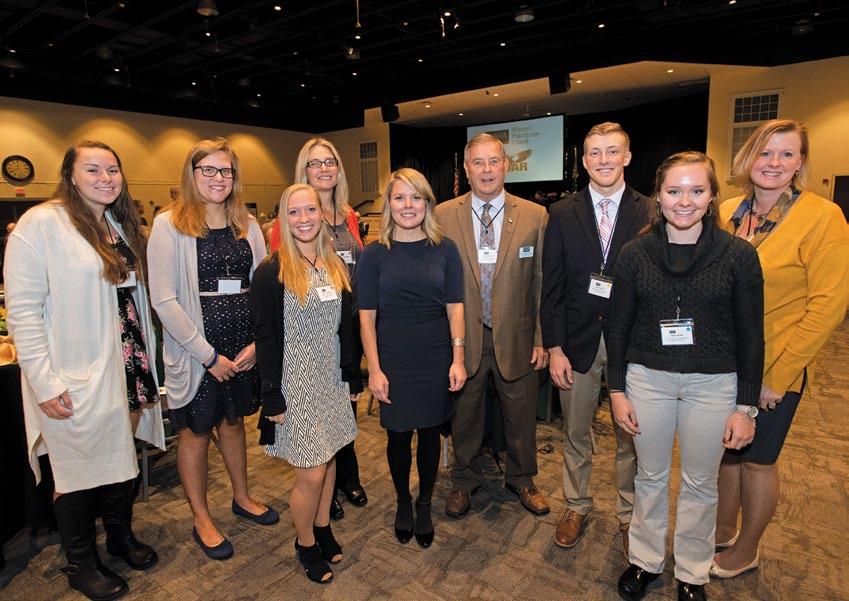
The William B. Read, Jr. Scholarship
The early 1970s were a tough time financially for Husson College. Enrollment dropped dramatically after the Vietnam War ended along with the draft. Marc Quinlan was a Husson student at that time. “There was little or no heat in the dorms because they couldn’t afford the oil,” he recalls.
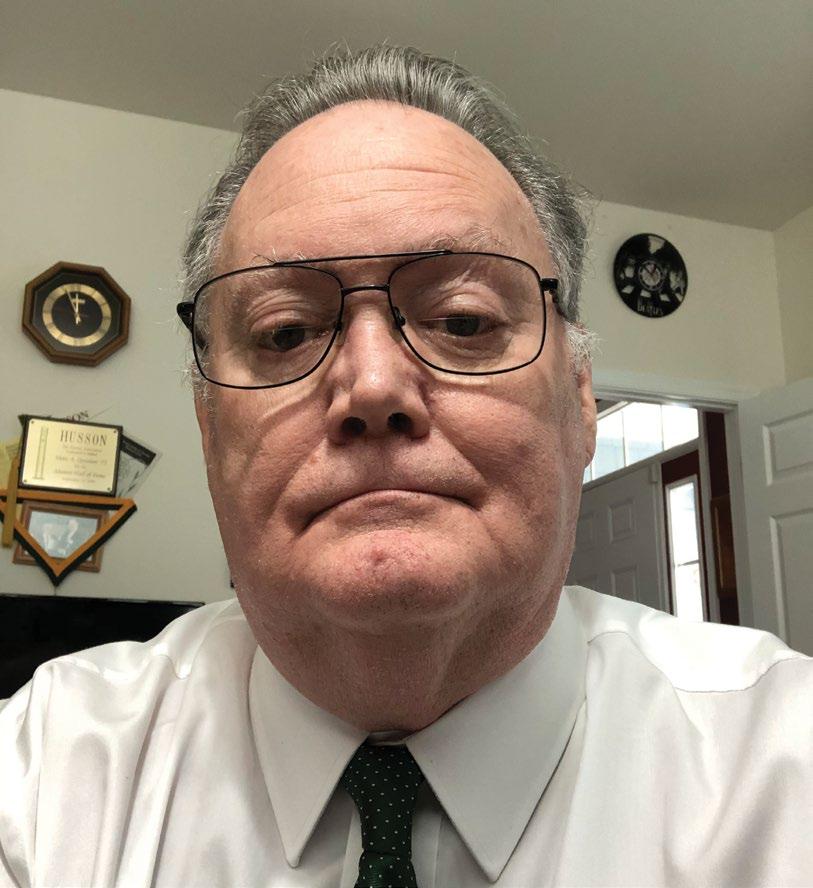
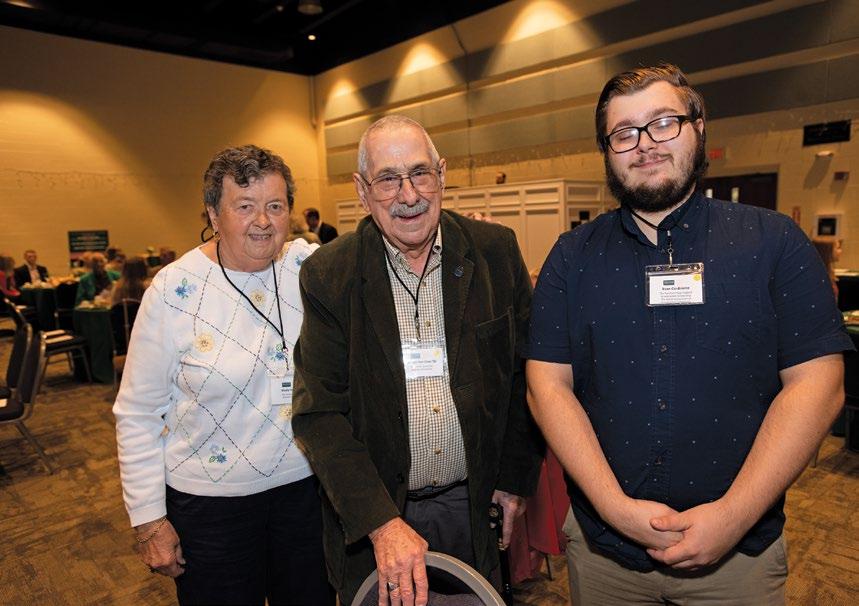
Quinlan remembers walking into his friend’s dorm room one day and seeing the guy’s roommate who was crying. “He had just found out his parents couldn’t afford to send him back to school the following year,” says Quinlan. “They were potato farmers in Aroostook County and even borrowing the money was not an option for them.”
The story stuck in Quinlan’s mind. “He had a 4 0 GPA,” remembers Quinlan. “I
didn’t have a 4 0, that’s for damn sure. That always bothered me.”
Quinlan graduated with a business administration degree from Husson and went on to become a successful sales manager. Today, Quinlan is the retired director of sales with Stockmeyer North America, a multi-billion dollar company and one of Germany’s largest food manufacturers and exporters.
But he never forgot his friend’s roommate. In 1995, Quinlan created a Husson scholarship specifically geared towards students from Aroostook County or the state of Maine and then alternating each year with students from New Jersey, where he lived at the time.
Quinlan named the scholarship in honor of Bill Read, his instructor while attending Husson, who also happens to be the longest serving professor at the school. "I started teaching at Husson 50 years ago," says Bill Read, professor emeritus in the School of Business and Management. "Husson was still on Park Street in downtown Bangor."

“Bill and I got along great,” says Quinlan. “A lot of students had issues with Bill. His courses were difficult. We just had a rapport – and we still do, all these years later.”
Since Quinlan started the scholarship, he has doubled or even tripled the amount each year. He credits his former professor and friend for the inspiration. “Students were always number one with Bill,” says Quinlan. “And they still are.”
"I continue to be very grateful to Marc establishing a scholarship in my name," says Read.
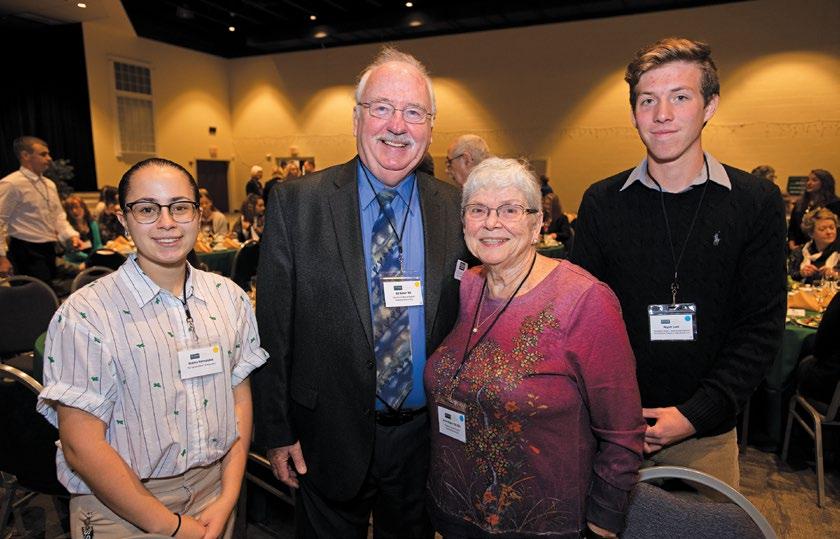
“ I wanted every student to have the opportunity to go to school without the pressure of how to pay for it. I also didn’t specify a certain grade point average. There are a lot of kids that are really trying and they’ll go somewhere because they have such drive.”
Gale Longo
The Dewey Martin Husson University Accounting Scholarship Fund
When Professor Emeritus Dewey Martin retired from Husson University’s School of Accounting last spring, he left behind a nearly 4 0-year teaching legacy that inspired generations of business students. “You know that you are making a valuable impression on people’s lives,” says Martin, “I’m really humbled by this honor."
Martin is referring to The Dewey Martin Husson University Accounting Scholarship Fund. The endowment includes gifts from about 80 Husson alumni and was put together in record time, just months after the committee planning Martin’s retirement celebration came up with the idea to create one. Members of the
committee included Renee Bishop ’89, Duane Graves ’88, Scott ’89 and Donna Oxley ’91, Tracey Whitten ’92, and Matt Walsh ’94, with a tremendous amount of additional support from staff members Nick Mamula and Nicole Bouchard
“Establishing the scholarship was a team effort,” says Renee Bishop ’89 and her husband, Duane Graves ’88 who were both former students of Martin. In fact, almost all of those involved in the endowment had Professor Martin for accounting.
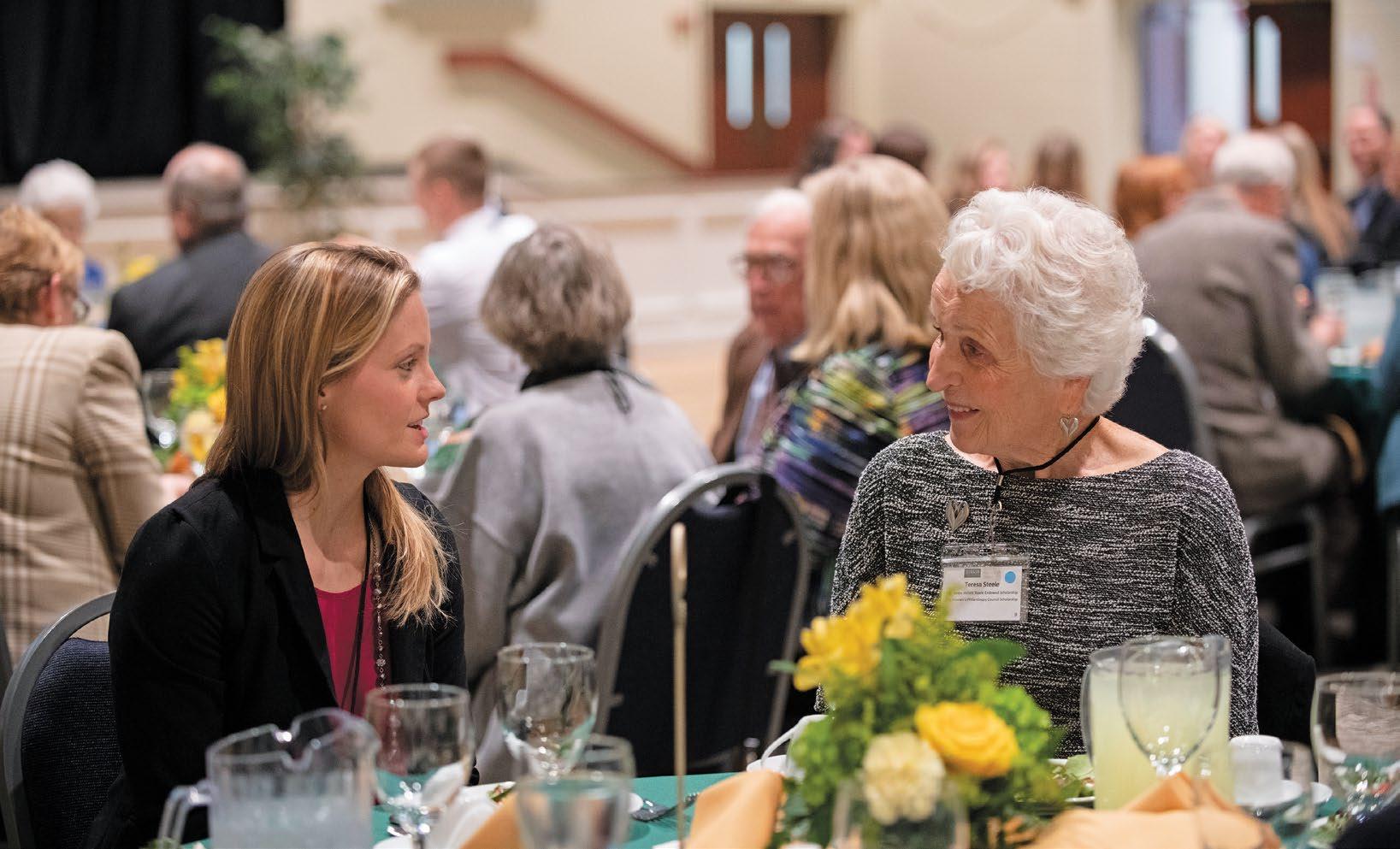
“Personally, both of us have so much respect for Mr. Martin and how his passion and advocacy has impacted the accounting profession in the State of Maine in so many positive ways over the course of his long career with Husson,” says Bishop and Graves.
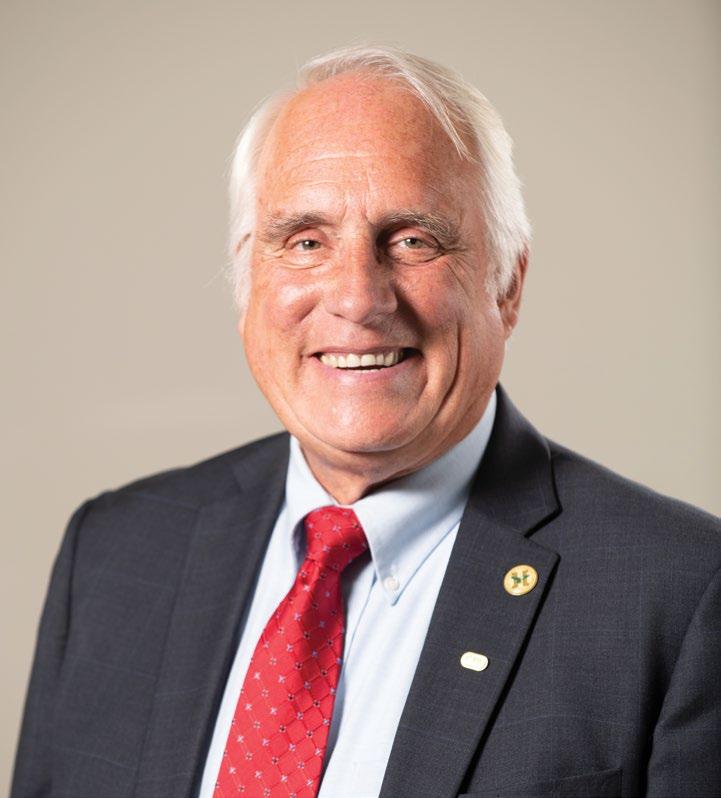
The recipient of the scholarship will be chosen by the School of Accounting faculty. It will be based on need with first preference being given to Maine high school graduates. “Our accounting majors have 100% employment after graduation,” explains Martin. “This scholarship can make the difference between whether a student can afford to continue their education at Husson, or will have to withdraw."
“Many of [Martin’s] students have chosen to stay and work in Maine,” adds Bishop. “At BerryDunn, we hire Husson students virtually every year and it has been an exceptional partnership. In these ways he has positively impacted not only his students but also our communities and the entire state of Maine.”
The Donna and Scott Oxley Husson University Scholarship
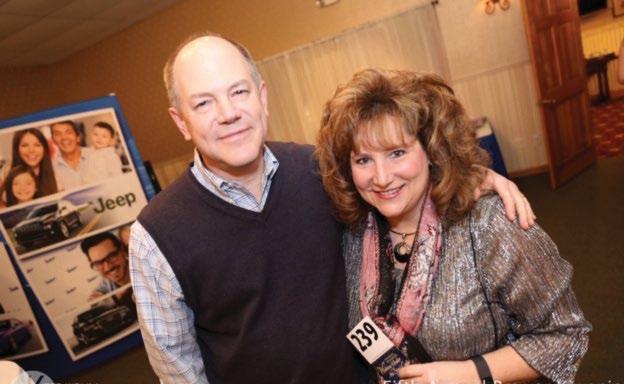
Scott and Donna Oxley met while both were public accounting students at Husson. “We actually did not date in college but we were very good friends,” explains Scott Oxley. Scott went on to work for Northern Light Health, formerly known as Eastern Maine Healthcare Systems. He is currently a senior vice president at Northern Light and president for Northern Light Acadia Hospital and Acadia Healthcare. Scott also serves on several boards including Bangor Savings Bank, Galen Cole Family Foundation, Community Health Leadership Board, Maine Hospital Association and the St. Paul the Apostle Finance Committee.
Donna (Beaulieu) Oxley began her CPA career at Coopers & Lybrand immediately after school. She is now a manager at the public accounting firm BBSC, CPAs. Donna is also involved in several organizations including the Maine Society of CPAs and the Husson University Board of Visitors. She also serves on the boards of the Maine Discovery Museum and the Institute of Management Accountants Bangor Waterville Chapter.
Both Scott and Donna were the first in their families to graduate with a four-year college degree. “We truly understand the value of an education” say the Oxleys. “We also recognize that many kids from Maine simply can’t afford to get the education that they deserve.”
That’s why the couple decided to create a scholarship for Maine students with preference given to their hometown roots of Madawaska and Nokomis Regional High School in Newport. “We hope this can make a difference in the life of a Maine kid in much the same way an education impacted us,” say the Oxleys. “We both realize that we are blessed to be able to live and work in central Maine and to have raised our family in this wonderful environment. We don’t take these blessings for granted and feel it is important to give back to others.”
“ We hope that this can make the difference in the life of a Maine kid in much the same way an education impacted us.”
—Scott and Donna Oxley
Campaign Committee:
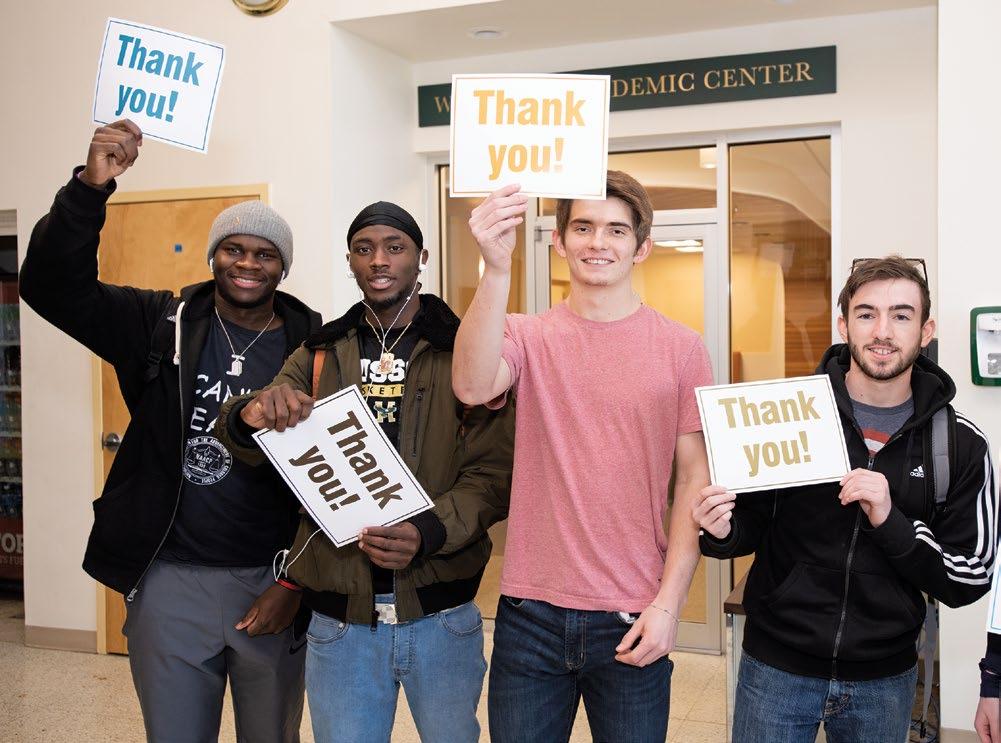
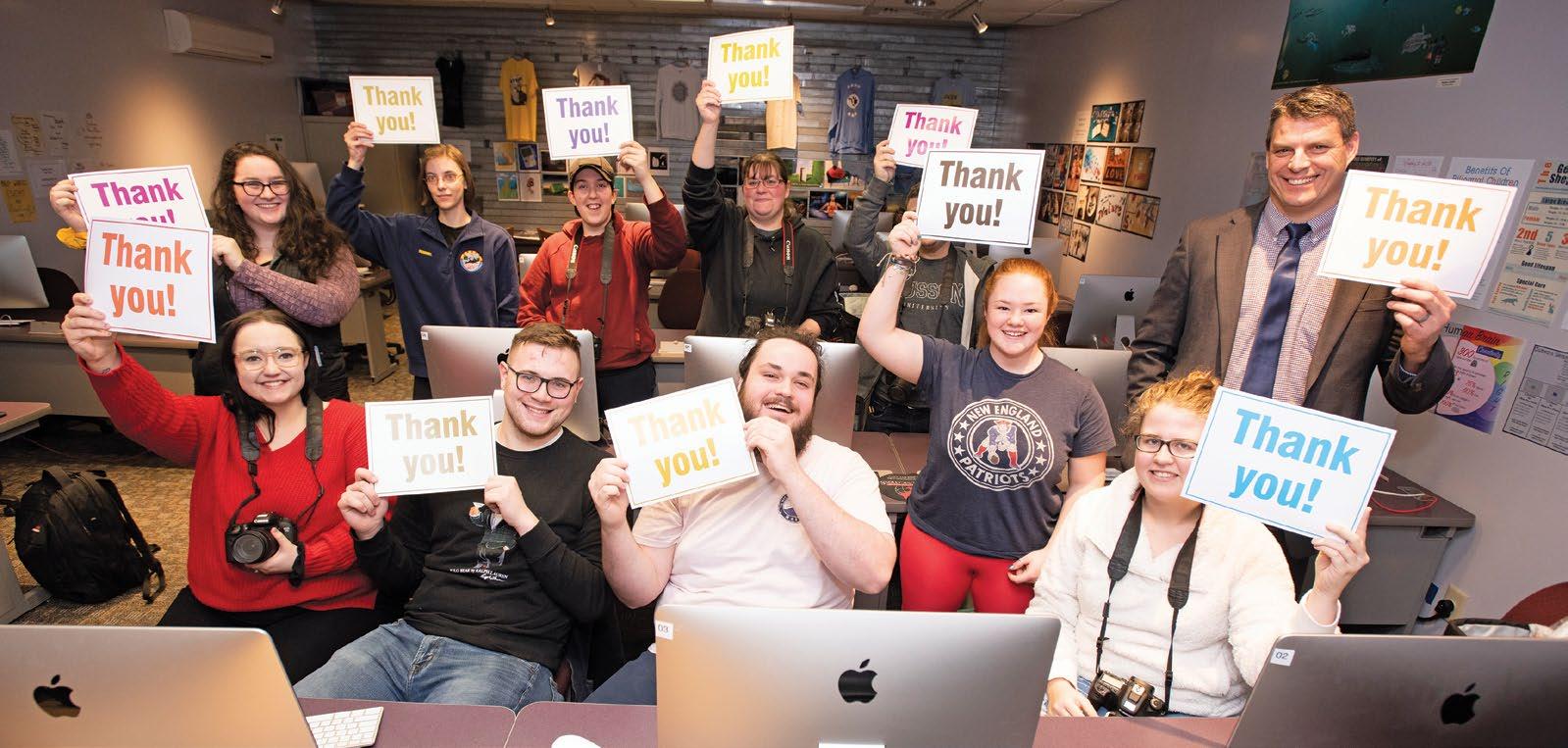
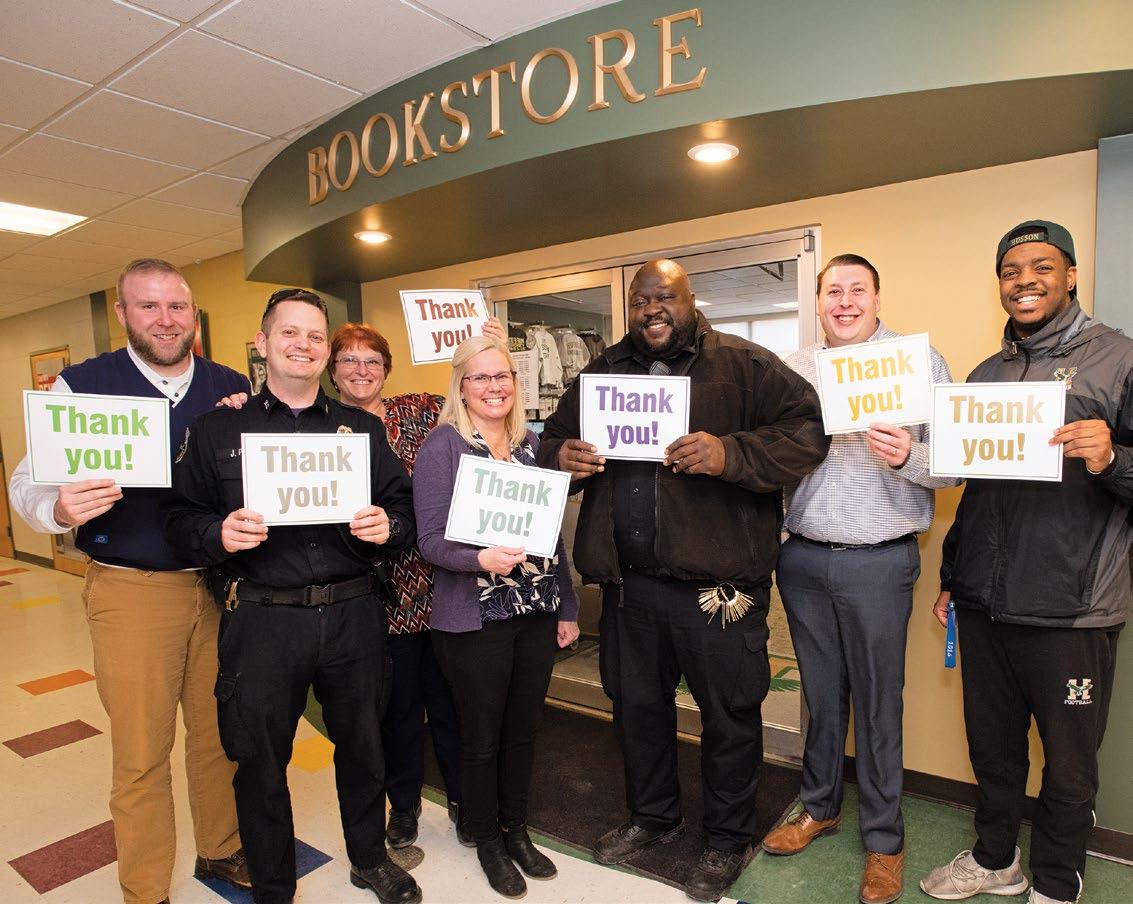

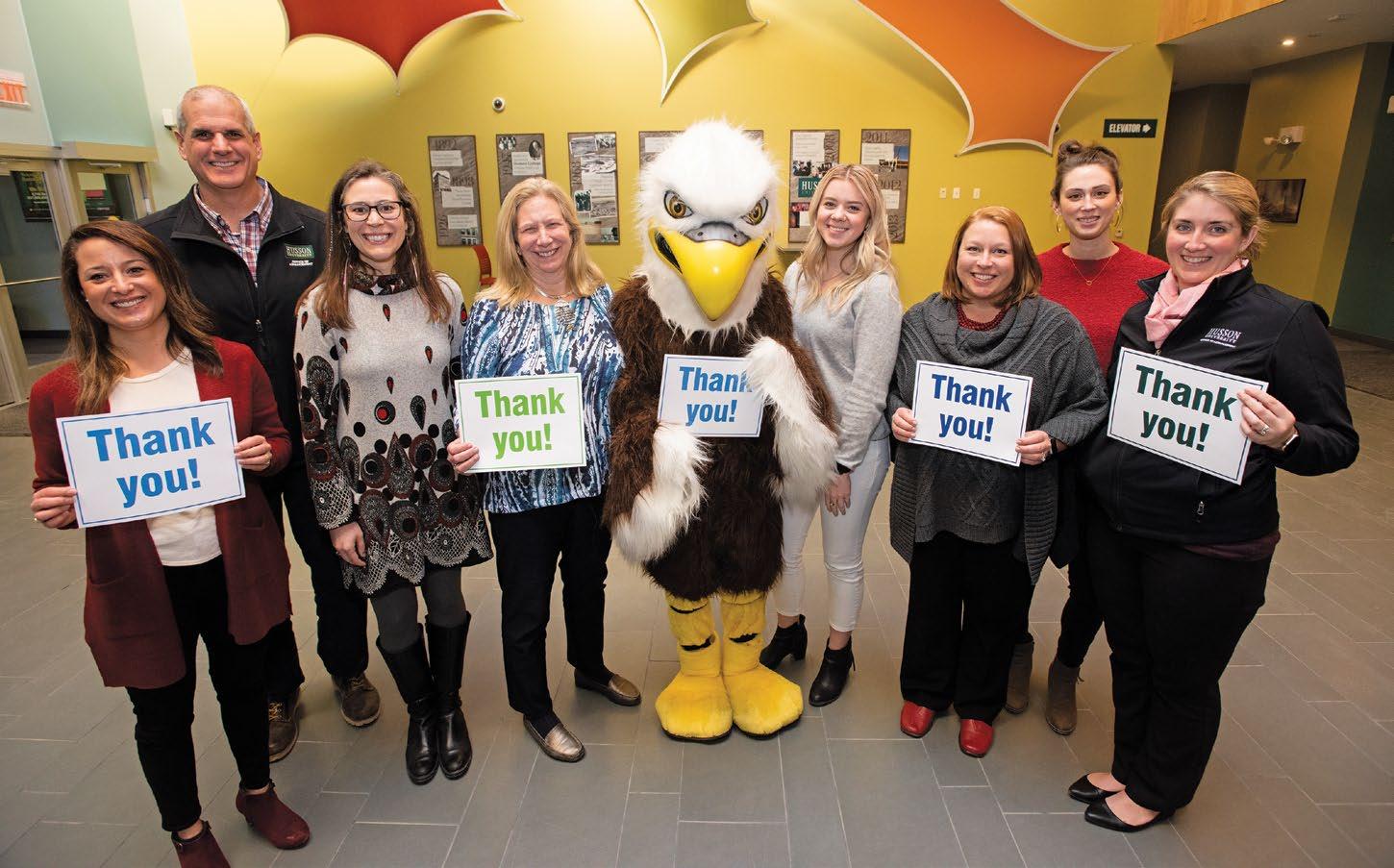
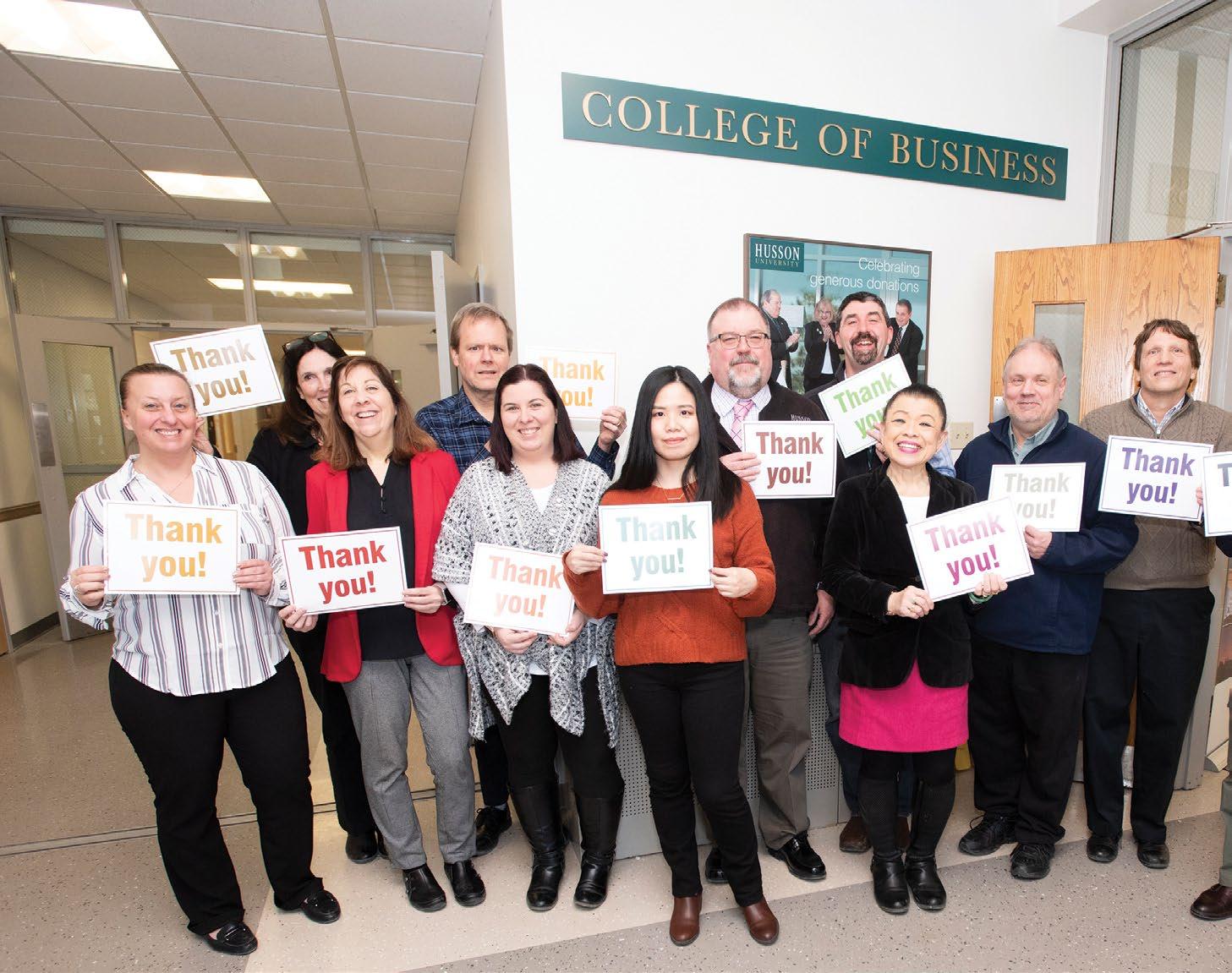
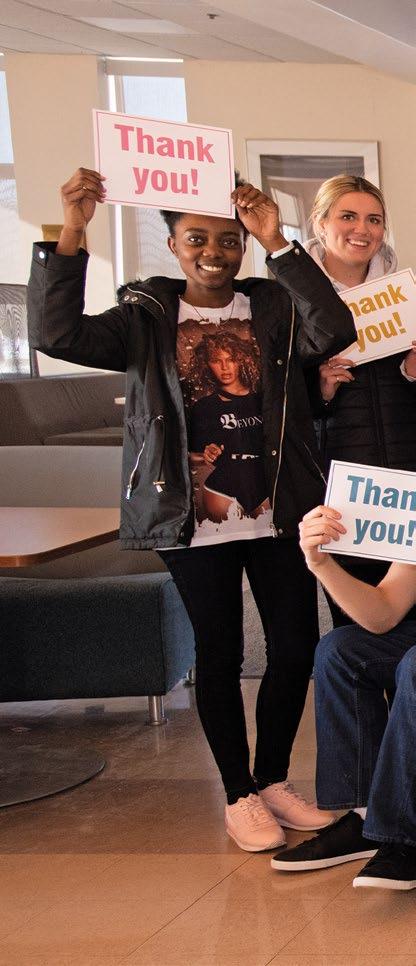
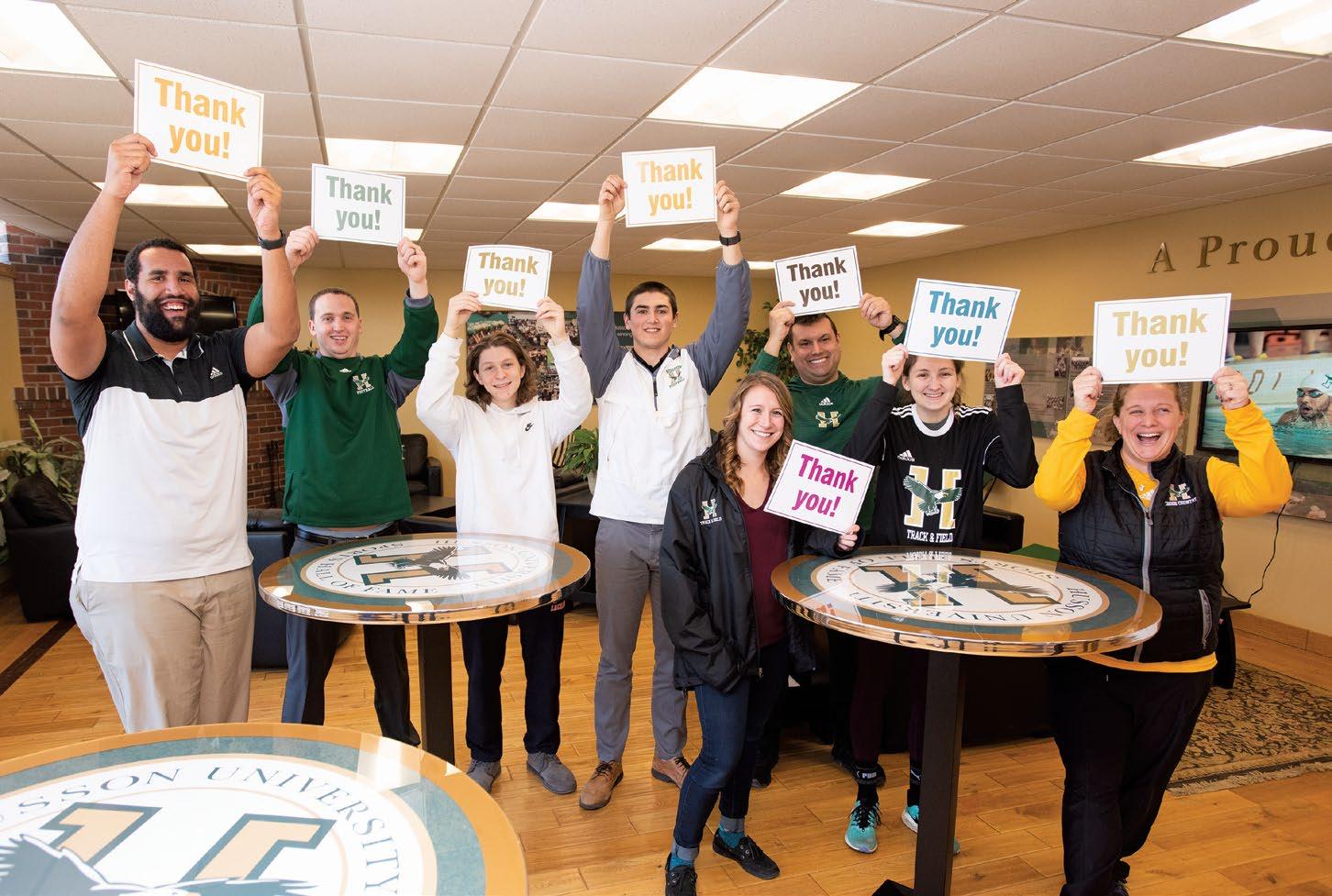
SuSan CarliSle
Sue Cyr
edward darling, Sr. ’64
philip harriman ’77
lambroS KarriS
John rohman ’77
waldron Sawyer, Jr. ’87h
aliCe trott
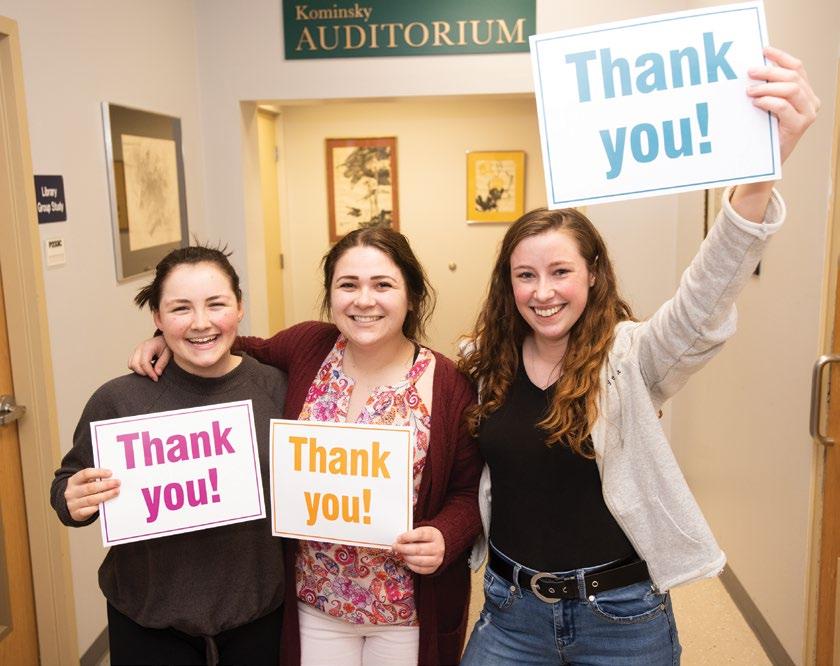
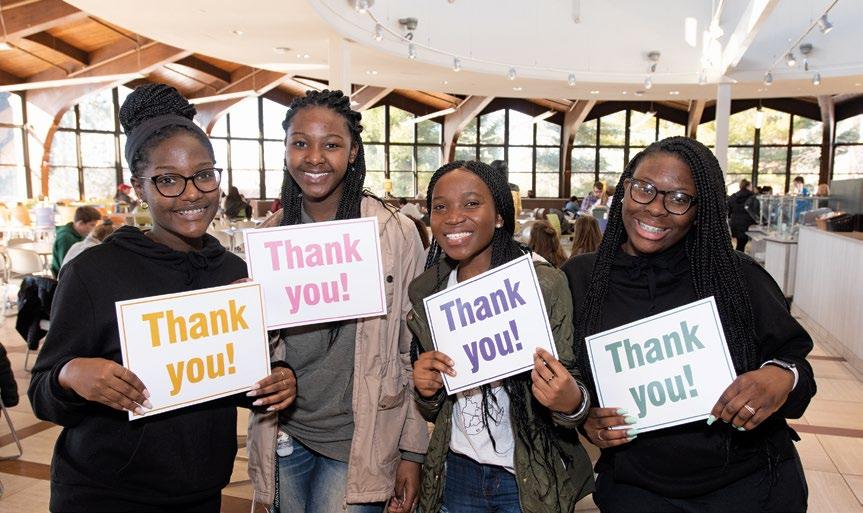

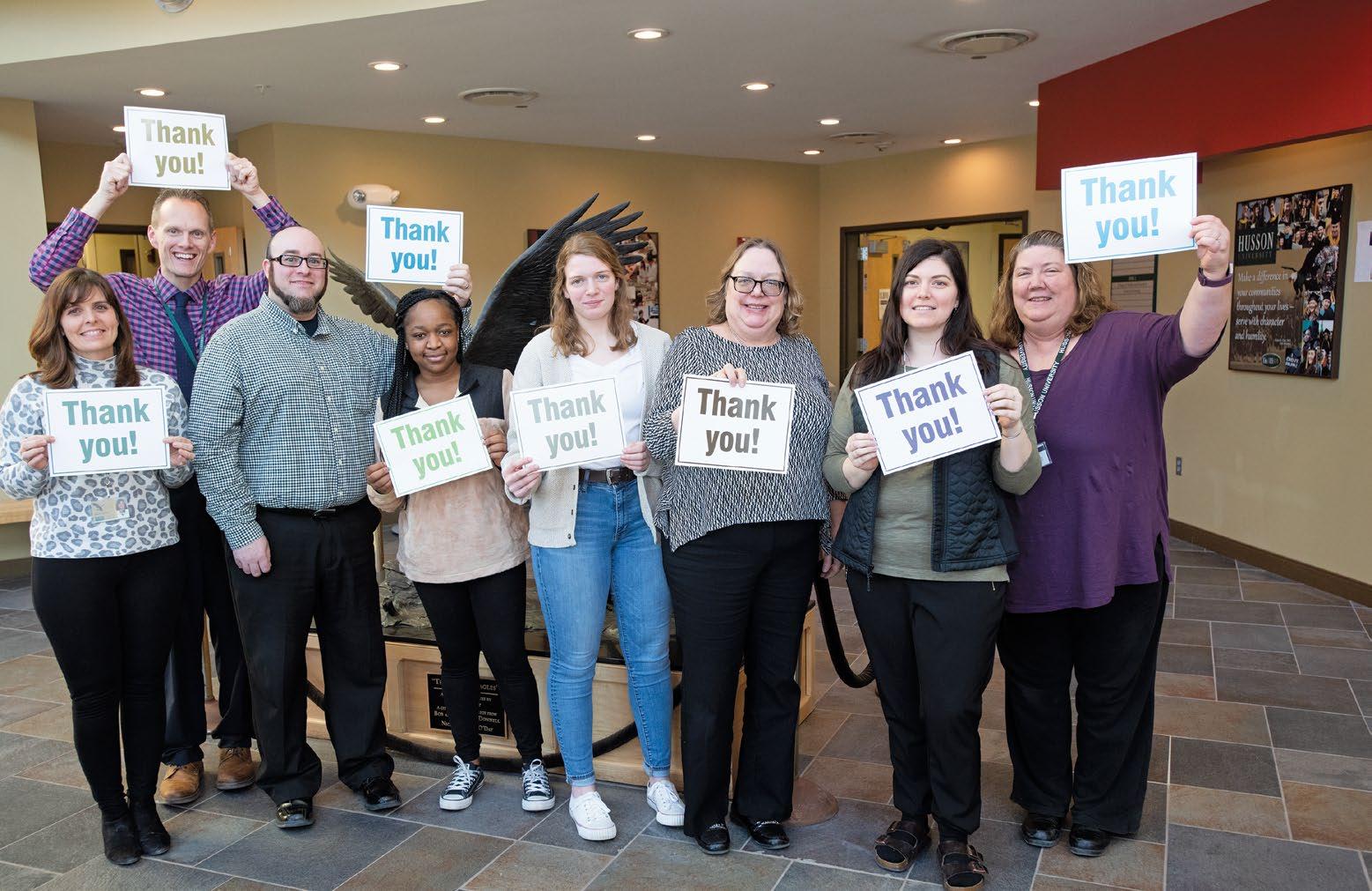




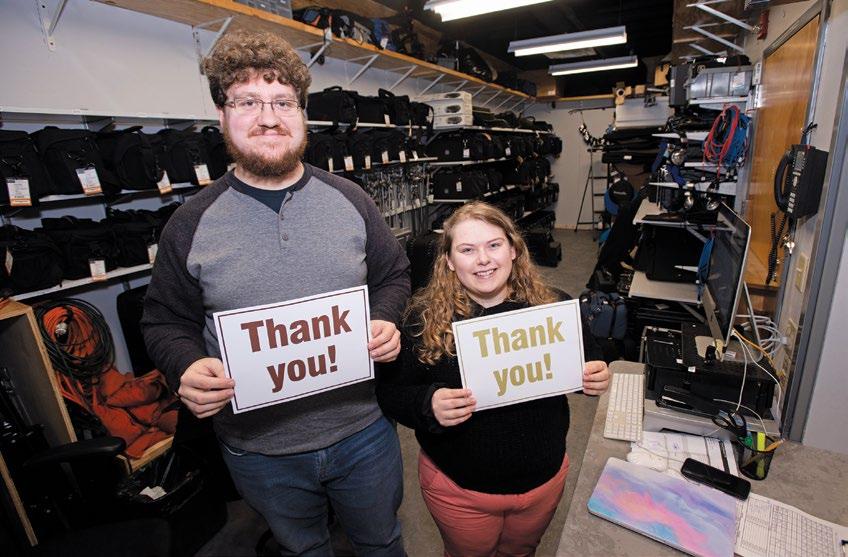


In 2019, Husson University launched its first-ever Giving Day. Giving Day is a 24 -hour online fundraising marathon that directly supports students and every aspect of campus. Last year, donors supported 64 different areas of campus, from athletics, to colleges and programs, to our student clubs and organizations.

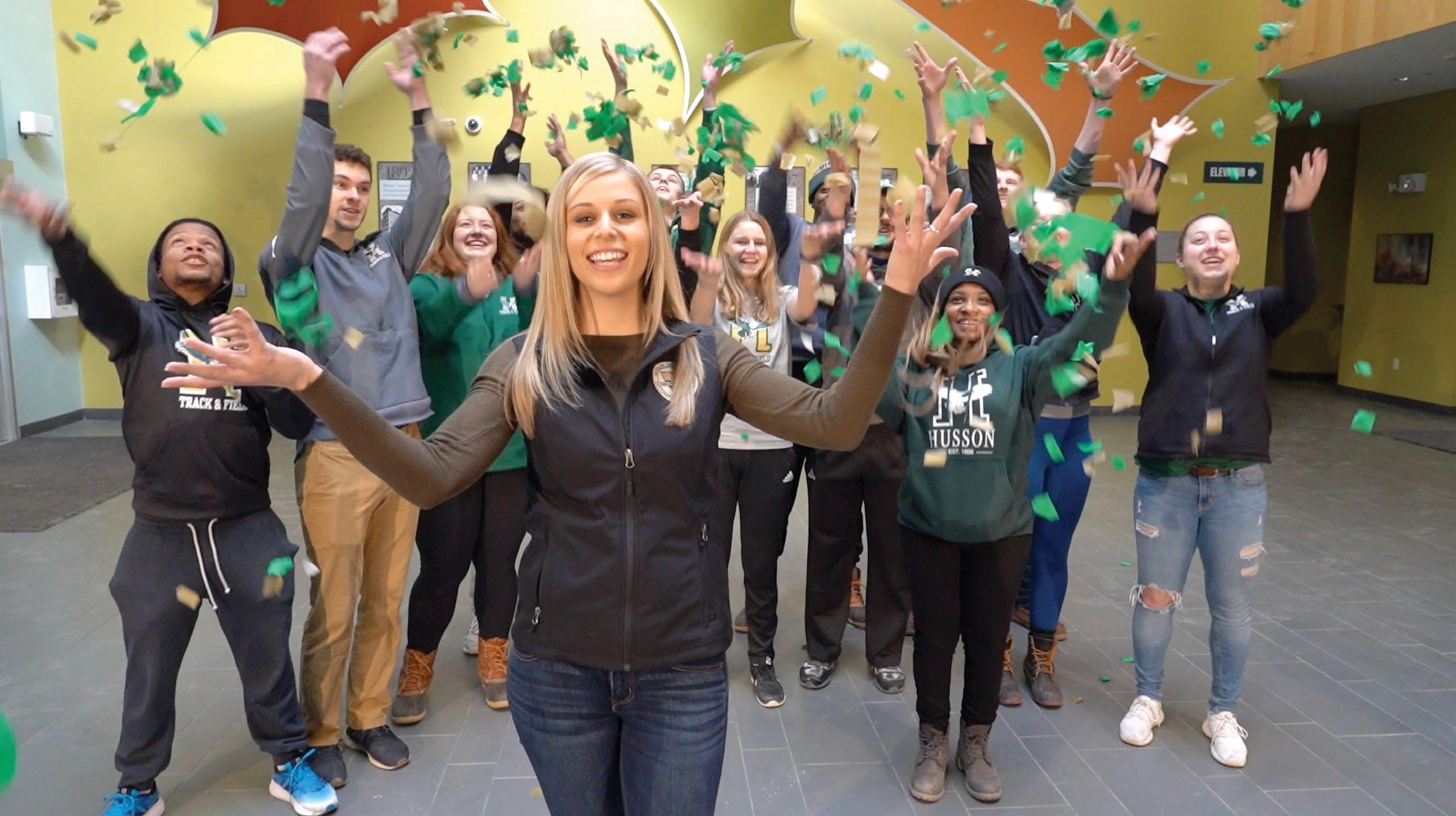

Sarah Robinson, vice president of advancement, said what the entire campus was feeling. “This was one of the best days on campus. Of course, the dollars we raised are important, but the energy and enthusiasm that's being generated as we encourage people to support the area of Husson that is most important to them is incredible!”
As Husson embarks on Giving Day 2020, the excitement is growing. With a goal of collecting gifts from 500 donors, the University encourages all Husson Eagles -- students, alumni, parents, faculty and staff, and the community, to give to the area of Husson that means the most to them.
Like Giving Day in 2019, this 24hour online fundraising challenge is primarily promoted through social media. Success with Giving Day happens when the community shares the areas they are passionate about with their circle of family, friends and colleagues.
“We were overwhelmed with the success that we saw last year,” said Lisa Frazell, director of annual giving. “There was a buzz about campus, competitions popped up between
different athletic teams, Eagles felt empowered to support the areas that they wanted. On Giving Day this year, April 8, 2020, we are hoping to grow that excitement.”
Thanks to some generous alumni donors, Giving Day 2019 resulted in friendly competition erupting between student clubs, organizations and athletic teams. Funds were up for grabs for the area that (1) had the highest percentage of alumni donors; (2) received the largest individual gift; (3) had the highest percentage of young alumni donors; (4) had the highest number of donors, and, (5) had the highest number of first-time donors. With an extra $500 up for grabs for each of these categories, the competition became more heated as the day progressed.
“We put together a designated website, www.husson.edu/givingday as an easy way for supporters to get involved and find their area of passion,” Frazell continues. “That, paired with competition made the event successful.”
During last year’s Giving Day, more than 700 gifts were made, including contributions from 305 first-time donors.
(1) Highest percentage of participating alumni donors: Men’s Basketball (27%)
(2) Largest individual gift: Men’s Lacrosse ($3,500 gift!)
(3) Highest percentage of participating young alumni donors: Men’s Basketball (28%)
(4) Highest number of donors: Women’s Basketball (81 individual donors!)
(5) Highest number of first-time donors: Women’s Volleyball (74!)
According to U.S. News & World Report, the average tuition and fees at a private college, for the 2019-2020 academic year was $36,801.1 In contrast, Husson University’s average undergraduate tuition and fees for 20192020 totaled just $18,940. That’s nearly half the national average!
Affordable tuition keeps the lifechanging power of education accessible to more individuals. Over time, tuition costs across the country have steadily increased. Not surprisingly, so have the levels of student debt to meet these costs. Student debt is one of the factors that forces many students to delay starting a family and buying their first homes.
At Husson University, we are driving the levels of student debt down. Our Office of Institutional Research found that the average student debt of Husson students in the 2015 – 2016 academic year was
$29,131. In the 2018-2019 academic year, that number was reduced by 15% to $24,732
Reasonable tuition and fees have become important points of distinction between Husson University and other institutions of higher learning. According to a recent analysis of tuition and fees by U.S. News & World Report, Husson University is the most affordable private college in New England.
In addition to careful budgeting, the Annual Fund is an increasingly important factor in helping Husson control its tuition and fees. As such, the Annual Fund was an integral part of the Shaping our Future campaign.

As the name implies, this is a yearly fundraising effort whose support directly and positively impacts the University’s annual operations. Over the campaign’s eight years, just over $5 million was contributed in both restricted and unrestricted gifts to help us meet the yearly operating costs of running the University. These gifts help us keep our
tuition low. Simply put, when donations pay for operating costs, students don’t have to.
While unrestricted annual fund gifts provide the greatest flexibility, allowing the University to apply this support to the area of most urgent and greatest need, donors sometimes choose to make restricted gifts. When donors make restricted gifts, they designate how their support will be used. These types of gifts are used to directly support a College, a program, a major, an activity, a sport, a scholarship or anything else the donor feels passionate about.
According to Sarah Cary Robinson, vice president for advancement, “We are so grateful for those individuals who made yearly contributions to the University over the course of the campaign. While the Shaping our Future campaign is completed, the need for a vigorous and growing Annual Fund remains. It’s one of the best ways to shape the future of the next generation, and help them get the knowledge and skills they need to achieve professional success.”
https://www.usnews.com/education/best-colleges/paying-for-college/articles/paying-for-college-
“ Donors don’t give to institutions. They invest in ideas and people in whom they believe.”
—G.T. Smith
The Shaping our Future Campaign provided almost $38 million in current and future gift commitments to Husson University. The success of this effort has strengthened our ability to benefit students.
Education isn’t a one-dimensional experience. The generosity of our donors has significantly impacted how we can provide for our students both inside and outside the classroom.
Faculty members who inspire students and get them excited about learning continue to be the cornerstone of a Husson educational experience. Donors have made it possible for us to bring prominent national thought leaders to our campus where they can share their expertise with our students.
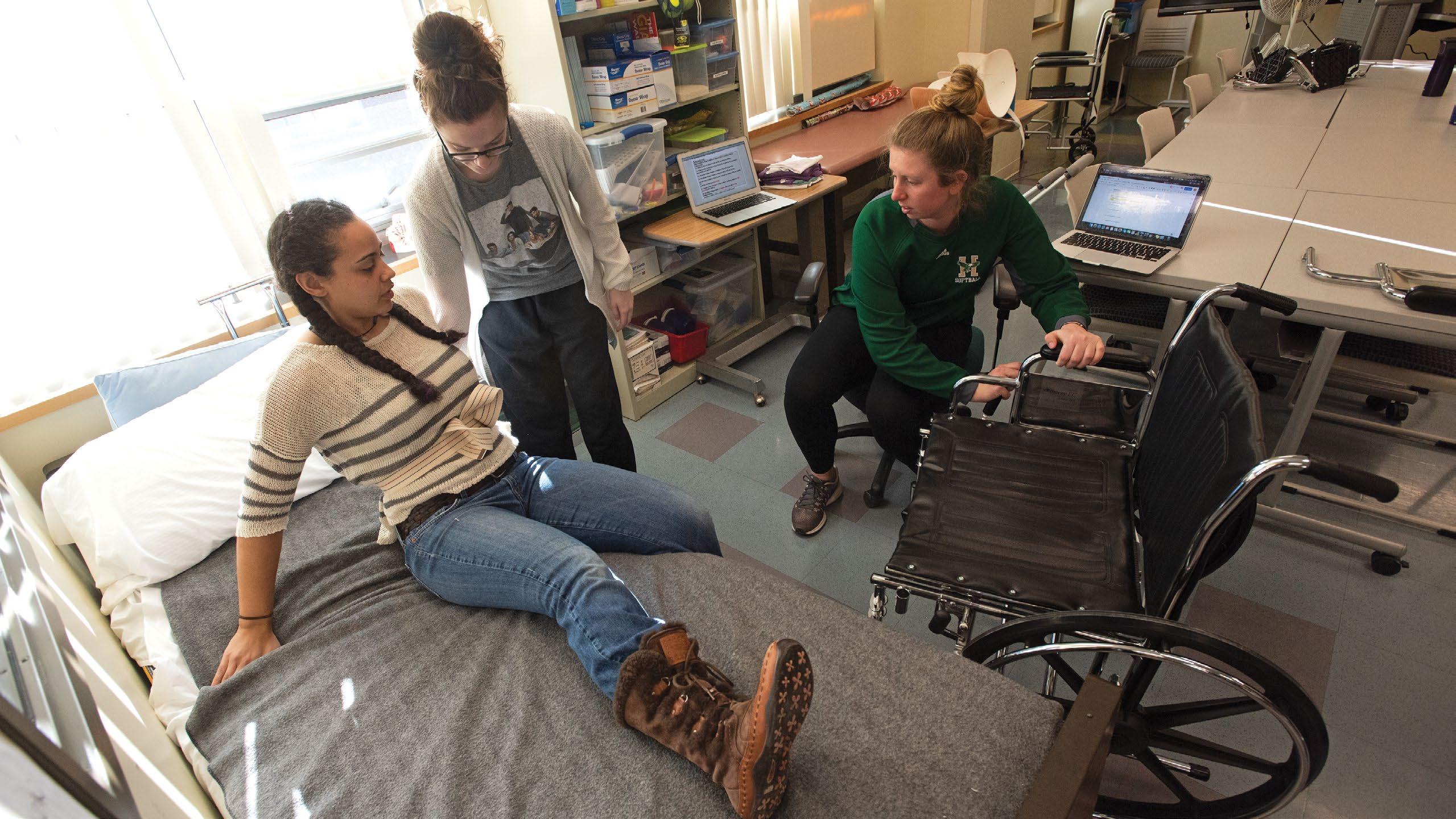
One such example is the Dr. Phil Grant Distinguished Professorship in Management and Economics. Thanks to a gift from long time Husson faculty member Dr. Phil Grant and his wife Kathy of Birch Harbor, Maine, the professorship,
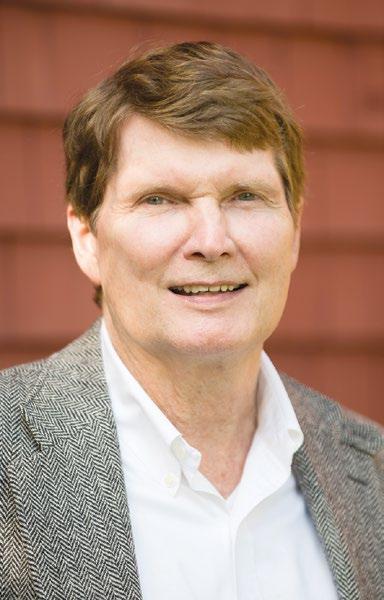
created in 2014, brought Dr. Steven Cunningham to our Bangor campus to teach undergraduate and graduate courses at Husson University’s College of Business. Cunningham worked as an economist at the Federal Reserve Board of Governors in Washington, DC, served on the board of directors of a national sports organization, was founding director of the Connecticut Center for Economic Analysis, and was the president, director of research and education, and chief economist of the American Institute for Economic Research. In addition to teaching, Dr. Cunningham conducts applied research in economics and management at an internationally recognized level. This was the first endowed professorship in our 122-year history.
that genuinely puts a priority on students, and maintains a warm, collegial environment with a supportive administration,” said Steve Cunningham, PhD, the Dr. Phil Grant Distinguished Professorship in Management & Economics.
“This endowed professorship has made it possible for me to share my experience, enrich the education of students, mentor junior faculty, assist in curriculum matters, make Husson a leader in regional economic development, and support the community through outreach. And now, as I attend national and international conferences and meetings, the people who know me now know Husson.”
fulfilling my professional dream of working at a high-quality university
“Dr. Cunningham brought a wealth of experience to his classes at Husson from his prior teaching and research. He has adapted to classes to meet the workforce skills he has identified by his contributions in the area on the Board of Directors for Eastern Maine Development Corporation,” said Marie Hansen, JD, PhD, SHRM-SCP, dean of Husson University’s College of Business and the New England School of Communications (NESCom).
“Further, he has identified future plans for economic focused classes that will expand opportunities for
“I am so grateful to Phil and Kathy Grant for their generous gift to Husson. Because of them, I am
the students. In addition to providing real-world examples to the students, he has also mentored faculty in their own scholarship including co-authoring papers with them.”
Support of the Annual Fund and gifts restricted to programs allow our faculty to attend professional conferences in their academic disciplines. During these conferences, our professors share their knowledge and learn from their colleagues. Students benefit from an informed faculty who can share the benefits of new knowledge in the classroom and in experiential learning activities.
Modern facilities create an environment that encourage students to engage with their peers and their professors. They can also help create “laboratories” for handson, experiential learning opportunities that are an essential component of a wellrounded education.
For the College of Business, Husson University was able to create the Ronan Center for Financial Technology on the first floor of the Edward O. and Mary Ellen Darling Learning Center as part of our campaign. Made possible by a generous donation from Bob Ronan ’79, a retired senior vice president of technology with Fidelity Investments and his wife Linda, a vice president in Fidelity’s technology area, the Ronan Center features LED stock ticker displays that show current market activity in real time. The new center also includes large interactive touchscreens that provide students with the ability to research stock, mutual fund and bond investment performance at the touch of a button.
The interactive nature of this classroom when combined with a pre-campaign gift from donors James ’64, ’97H and Carol Carlisle of La Jolla, California
have created an opportunity for an extraordinary real life and real-time learning experience for students taking finance classes. The Carlisle’s gift created a student investment fund. Working under the guidance of our faculty, the students determine which stocks to purchase and sell in the fund. Many continue to follow the fund and the performance of the stocks they have chosen even after the class has ended.
The Carlisle fund, however, doesn’t just impact student lives through providing an experiential learning opportunity. Considered part of the University’s endowment, this fund provides scholarships to students hailing from Western Maine who have demonstrated financial need.
When the new College of Business building is complete (see page 4), the Ronan Financial Center will be relocated to a space near the first-floor entrance as a signature experiential learning space in the new facility.
In our healthcare programs, experiential learning spaces provide an opportunity for
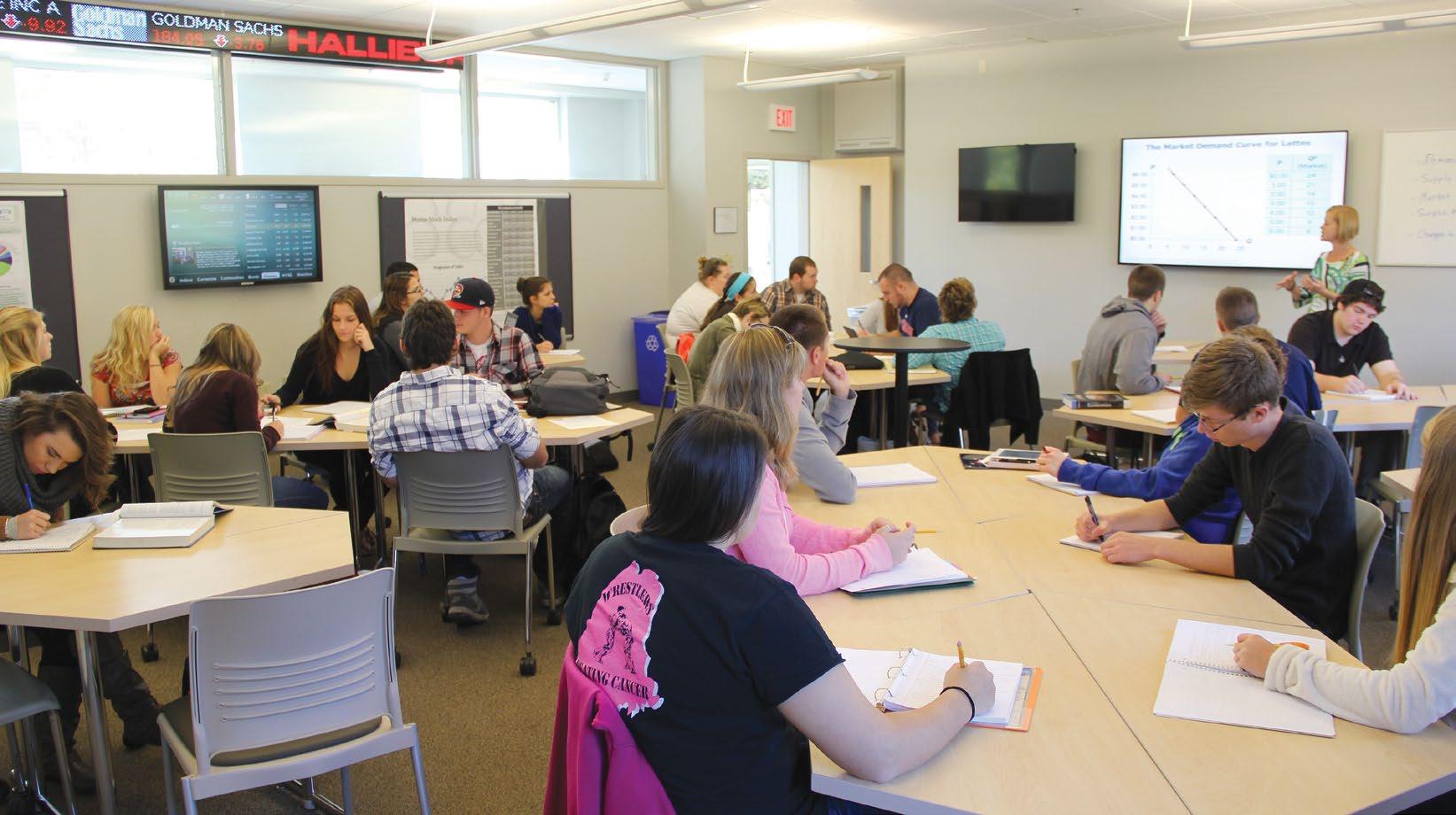
students to practice and make mistakes in a safe space without the added fear of hurting or harming real patients. Husson has had simulation spaces and manikins for some time, but the improvement in technology had outstripped our ability to keep pace.

In 2017, The George I. Alden Trust supported the renovation of a clinical health sciences learning/lab space in O’Donnell Commons. Removing a wall and reconfiguring space, allowed for a larger and safer clinical space that grew the current lab space from approximately 650 square feet to 1,525 square feet. The new learning/lab space enhances experiential learning in our occupational therapy program by providing modern equipment in a real-life setting. In
addition, an upgraded technology infrastructure was added to the facility that allows professors to easily access virtual telehealth resources that facilitate classroom instruction. The remaining space was reconfigured to create office space so that faculty are always nearby
Simulation Center in the new Wellness Learning Center The Ronan Center for Financial Technology“ As healthcare changes and shifts from traditional models of delivery to innovative population focused delivery, the simulation environments we are fortunate to have at Husson, help us to provide flexibility in teaching and learning well into the future."
Valerie C. Sauda MSN, RN-BC, CNE, MGSF
to lend a helping hand when students are working and practicing in the lab.
Thanks to support from the William Randolph Hearst Foundation and the Stephen and Tabitha King Foundation, Husson was able to expand and improve simulation spaces both in O’Donnell Commons and the new Wellness Learning Center. The simulations are quite realistic. The manikins talk. They have a pulse, breathe and blink. It’s also possible to practice giving medications to the manikins. Making these simulations as real as possible helps students learn how to handle real-life situations with actual patients.
“Our ability to offer real-life opportunities to our students such as in the simulated apartment space provides invaluable hands on learning in a safe and structured environment,” said Valerie C. Sauda MSN, RN-BC, CNE, MGSF, an interim chief nurse administrator and assistant professor at Husson University’s School of Nursing. “As healthcare changes and shifts from traditional models of delivery to innovative population focused delivery, the simulation environments we are fortunate to have at Husson, help us to provide flexibility in teaching and learning well into the future."
In particular, we are proud to be the first institution in Maine to house a
unit focusing on maternal and child health. One simulation bay features a lifelike manikin who can give birth. The second bay is structured like a neonatal intensive care unit, also known as a NICU. These hospital environments specialize in treating premature babies and newborn full-term babies with serious health issues. This maternal and child health unit provides our students with experiences that they would be unlikely to encounter during normal clinical placements, helping them gain valuable experience before they graduate and are working.
“Husson University’s College of Health and Pharmacy uses simulationbased learning experiences to bridge the gap between the classroom and clinical practice in order to graduate practitioners who demonstrate confident and competent practice skills in a variety of clinical situations,” said Rhonda Waskiewicz, EdD, OTR (ret.), dean of the College of Health and Pharmacy. “The use of simulation as an educational and assessment tool has become widely accepted by healthcare education and their accreditors across the healthcare disciplines.”
With better and expanded simulation technology, we have been able to double the size of our nursing program. This will help address the critical shortage of
nurses we currently have in Maine – a shortage that’s anticipated to worsen over the next decade. In addition, the new spaces have allowed improved opportunities for interprofessional education (IPE) opportunities among nursing, physical therapy, occupational therapy and pharmacy students. IPE is becoming an increasingly important focus in the healthcare community. Each profession brings a different skill set and focus to patient care. When effectively combined, the patient receives better and more cohesive care that is focused on the whole person rather than a particular illness or injury.
Besides direct academic and learning space, student gathering and study space helps our students learn and graduate. A generous gift from Randy Wadleigh ’87, the president and chief executive officer of Governor's Restaurant, and his wife Angela, allowed Husson University to create the Wadleigh Academic Center in March of 2015. Located in a room adjacent to the lobby of Husson’s Newman Athletic Complex, this modern study space exists to help athletes and other students prepare for academic success. It’s comfortable, adaptable design encourages student collaboration and learning.
When students succeed academically, they are more likely to continue their
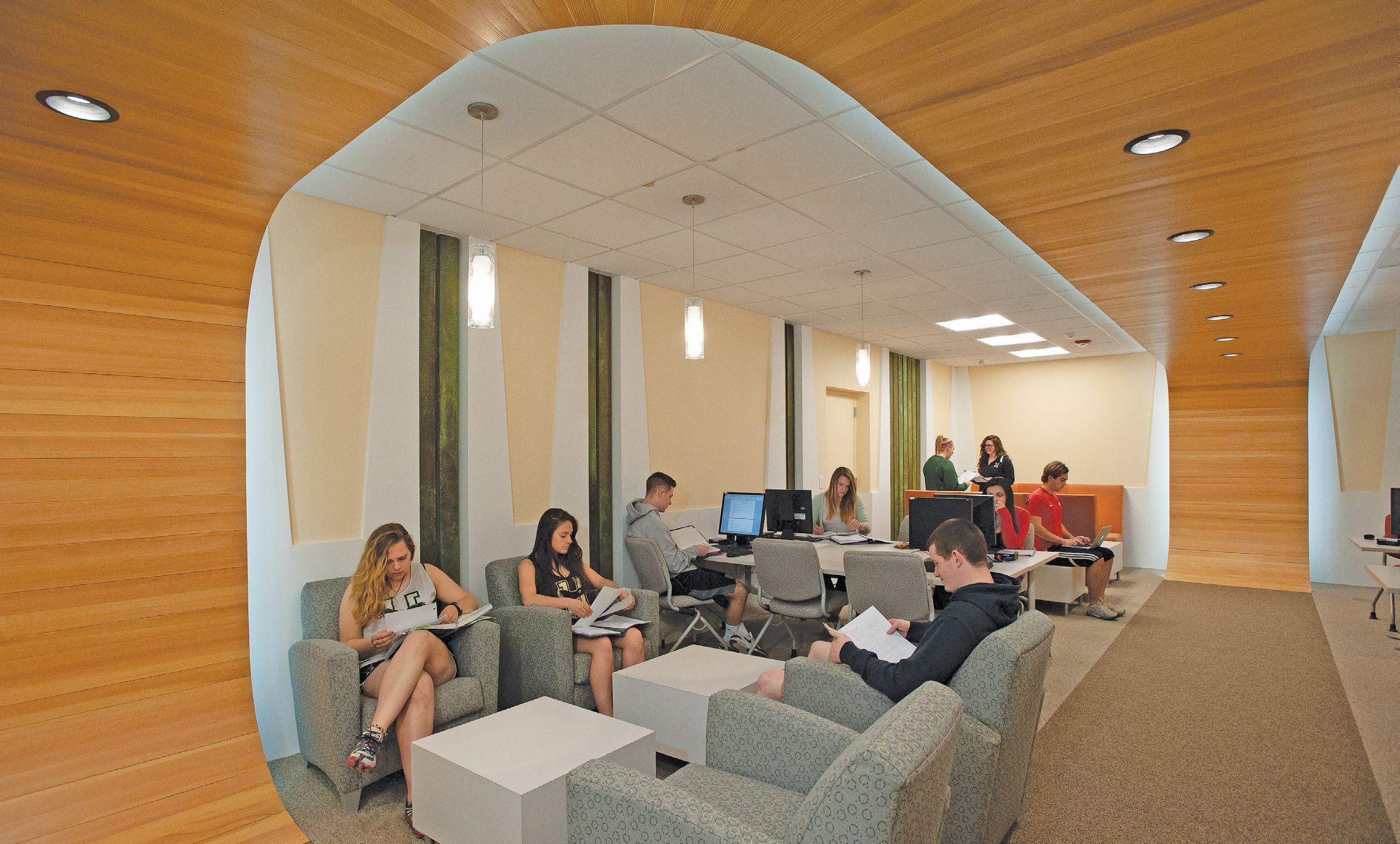
The average grade point average (GPA) of Husson University athletes for the 2018-2019 academic year was 3.15.Wadleigh Academic Center
studies. This enhances student retention at Husson University. The academic standing and retention of our student athletes is outstanding. For example, the average grade point average (GPA) of Husson University athletes for the 20182019 academic year was 3.15. At Husson, our student athletes are devoted to their academic studies and athletic excellence.
Athletics and student clubs provide opportunities for students to practice skills learned in the classroom, to develop communication, relationship and leadership skills, and to learn how to exist as part of a larger, more intricate community. The University has over 50 student clubs and 22 NCAA Division III athletic teams. Financial support for our athletes and club members improve the quality of their experience here at Husson. For example, a trip with an
athletic team may represent the first time an athlete has flown or left the state of Maine. Professional clubs raise funds so that students can attend state and national conferences in their fields of study. Service clubs raise funds to help the community.
One such initiative was the Fighting Eagles Boxing Club – a joint effort of Husson University physical therapy and occupational therapy students. Donor support helped students find the resources they needed to rent a space at the Union Street Athletics/USA Gym where the club members led non-contact, boxing-oriented wellness classes. Designed to help Parkinson’s patients, these classes allow participants to improve their balance, strength, coordination, and fine motor skills, including finger manipulation and small hand movements.

Sometimes donor support helps the University explore new educational directions and initiatives. Thanks to an anonymous donor, we are exploring opportunities in augmented and virtual reality. Designed as a collaborative effort between the College of Business and the New England School of Communications, the new IEX Center will open in the new College of Business building, bringing together the technical, creative and business aspects of this burgeoning field. In fact, it is estimated that the industry could grow to be worth $61 4 billion by just 2023 1 Early adoption of this technology has put Husson at the leading edge of this effort.
Your University is growing and thriving at a time when many schools are struggling to attract the declining number of students looking to attend college. The success of the Shaping our Future Campaign is measured not only in the dollars raised—though significant and important—but also in the respect and faith that our supporters have in Husson University. Your University is stronger and better prepared today to meet the challenges ahead for the generations of students to come as we continue to work to enhance and improve the Husson experience.
1 CitrusBits, “35 Essential Augmented Reality Stats, Facts, and Trends for 2020 and Beyond,” https://citrusbits.com/stats-and-facts-aboutaugmented-reality/
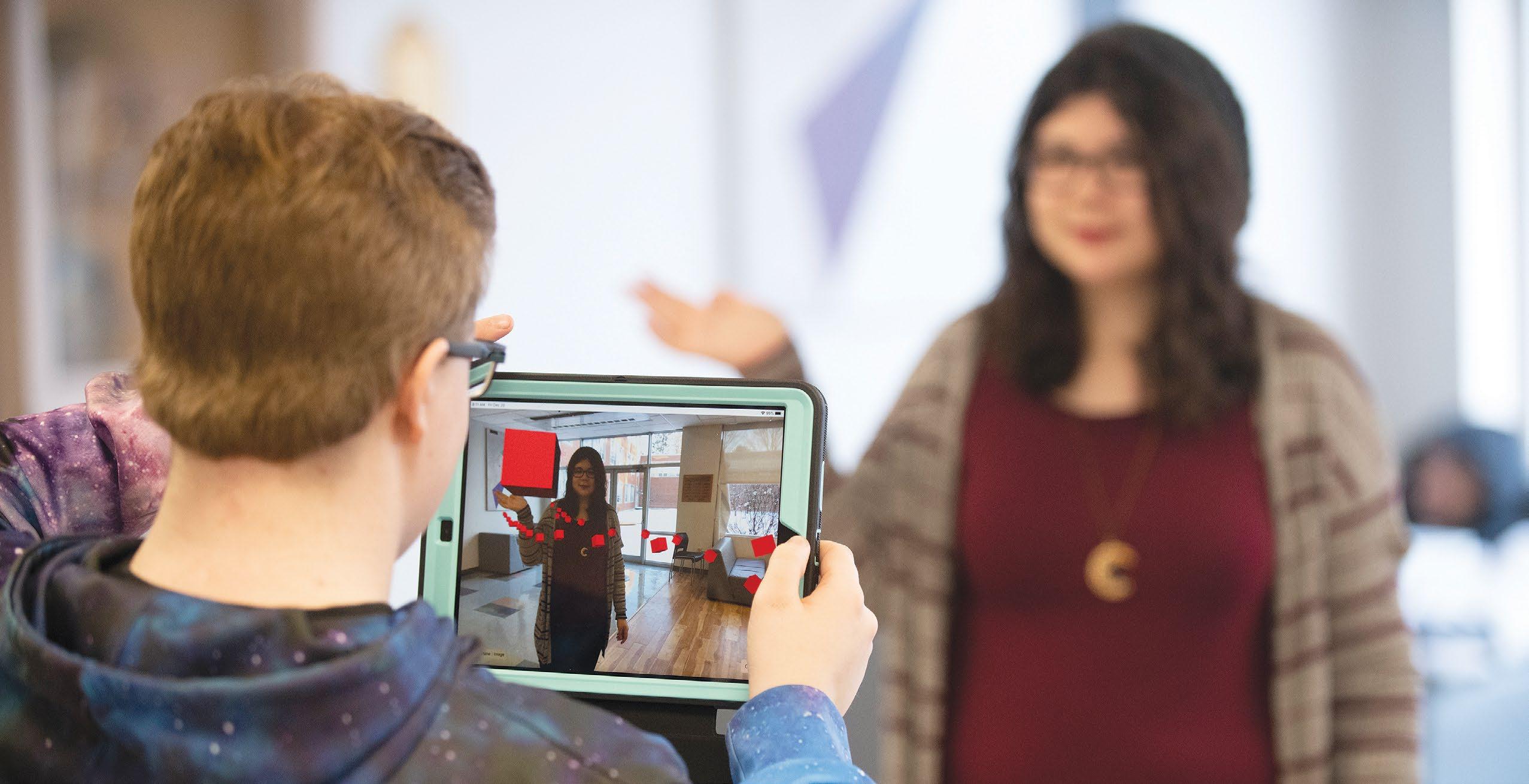 Augmented and Virtual Reality
Augmented and Virtual Reality
It is estimated that the [augmented and virtual reality] industry could grow to be worth $61.4 billion by just 2023.1
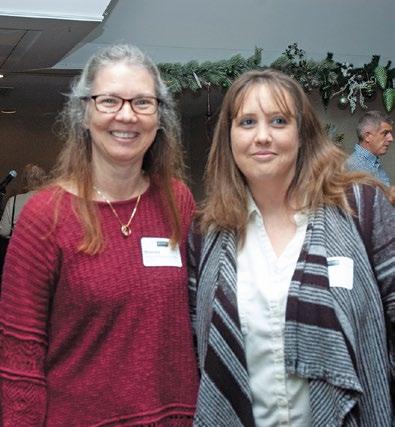
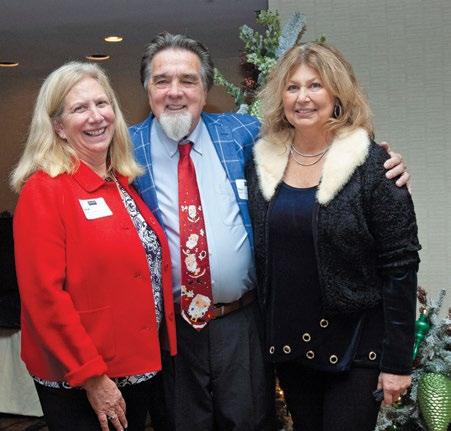
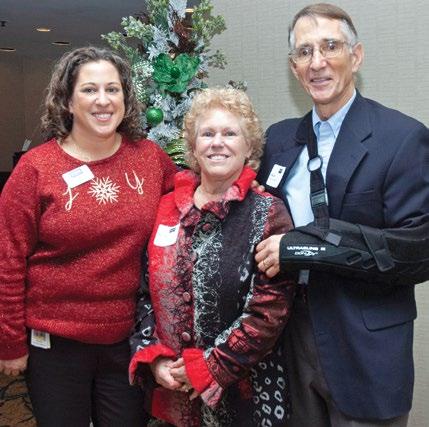
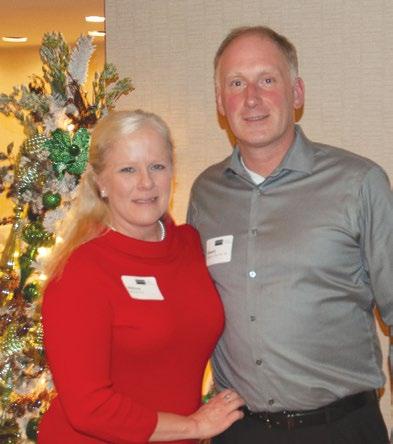

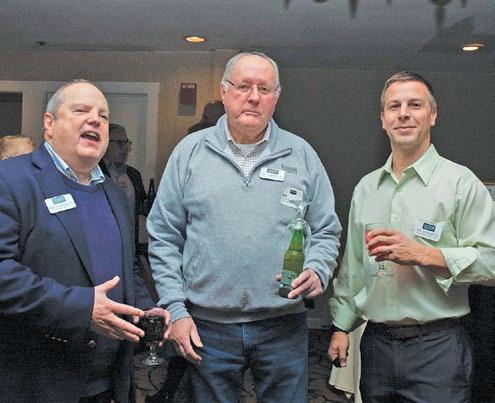

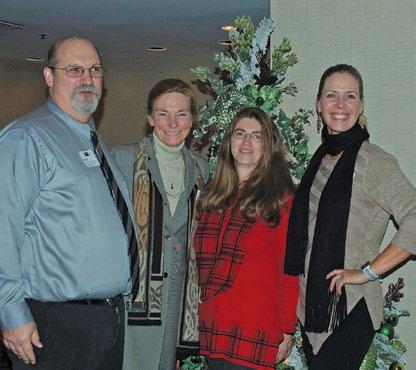
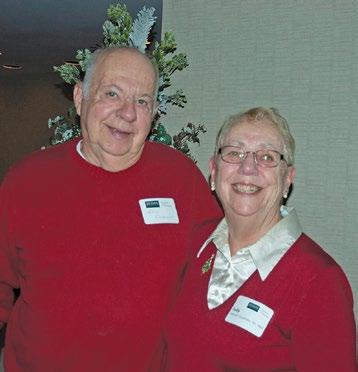
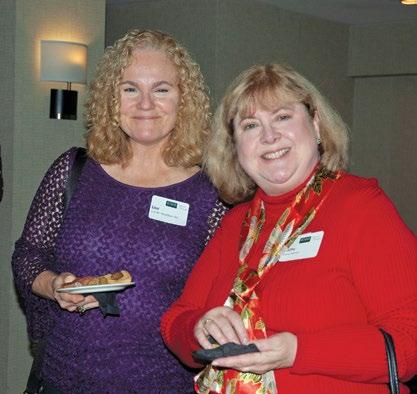
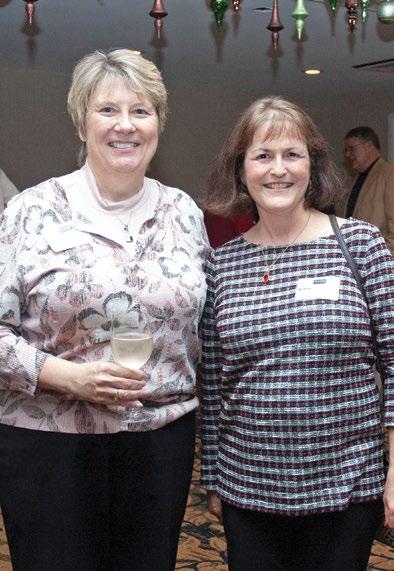
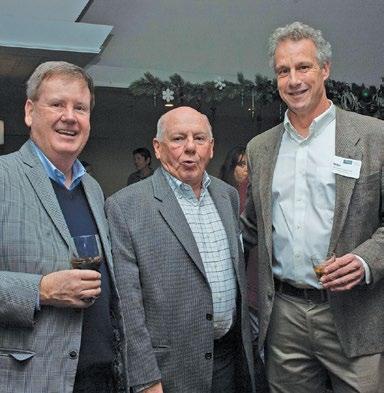
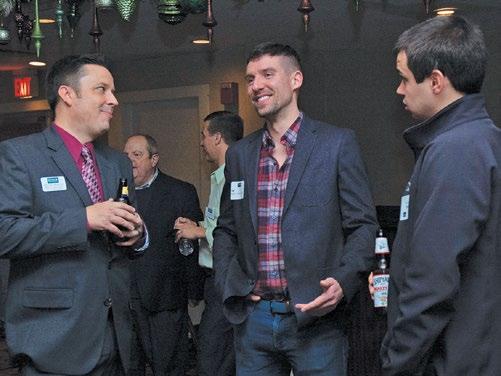
To help these alumni reconnect to the University, Husson’s Southern Maine Alumni Board decided to hold a holiday gathering at the DoubleTree by Hilton Hotel in South Portland. Eighty-five alumni with degrees from all sorts of different disciplines attended. Those in attendance also represented a variety of class years, with graduates from the 1960s to 2019 in attendance.
Also in attendance were Southern Maine Alumni Board members, President Clark and members of the Husson Advancement team including Keith Piehler, director of alumni relations.
“This event started in 2018 and continues to receive enthusiastic support,” said Amy Fecteau, ’05, ’12G, and chair of the Southern Maine Alumni Board. “Many of our alumni want to stay connected to Husson University without having to travel to Bangor. This event provides these graduates with an opportunity to socialize with fellow Husson alumni at a convenient location.”
The event also gave alumni an opportunity to hear about Husson University programs, the “Shaping our Future” campaign and the new College of Business building from Husson University President, Robert A. Clark, PhD. Many alumni were impressed by the growth of the Bangor campus since they had attended.
The holiday party consisted of hors d’oeuvres, desserts and a cash bar. When the event was over, each person received some Husson University branded swag. This included reusable bags, padfolios, and water bottles.
Brian Walsh ’79, the Southern Maine Alumni Board vice chair, thought that the personal connections were the highlight of the evening. “Many of us were able to make new friends and connect with people we didn’t know previously,” said Walsh. I enjoyed all the stories people told about their time at Husson. Regardless of whether people attended the Bangor campus or the Southern Maine campus, people feel a deep connection to this University.”
That connection extends to people beyond the Southern Maine area. Cory Bogart ’10, drove up from Massachusetts to attend the event. “I felt an innate bond with everyone at the Southern Maine alumni gathering and I’m looking forward to joining everyone next year.”
Anyone interested in attending next year’s Southern Maine Alumni Holiday Party can get information by following the Husson University Alumni & Friends Facebook page or reading our fall Alumni & Friends e-newsletter. Interested attendees can also email Keith Piehler, director of alumni relations at alumni@husson.edu or call him at (207) 941-7875.
“I felt an innate bond with everyone at the Southern Maine alumni gathering and I’m looking forward to joining everyone next year.”
Cory Bogart ’10
After graduation, many Husson University alumni choose to live and work in Southern Maine.Tamera Vogel ’88
1. Tell us a little bit about your work history, and what you’re doing now.
MICHAEL: My experiences have been in event centers, hotels, and restaurants. Since Husson, I opened Lucky Clover Hospitality LLC, solely selling travel. Sutton Travel Weddings and Events LLC is my latest business and will expand services in the hope of attracting more clientele and diversifying my services offered. I currently live in Bangor and also am going for my Doctor of Business Administration at Keiser University online.
TAMERA: While a student at Husson, I began a 25year career at Unum where I worked in finance, leadership, and project management. I currently work at OceanView Retirement Community in Falmouth, where I help families with the challenging decisions facing our older adults. It is a very rewarding job that utilizes my experiences in customer service, sales and marketing in a culture that is compassionate and focused on helping others.
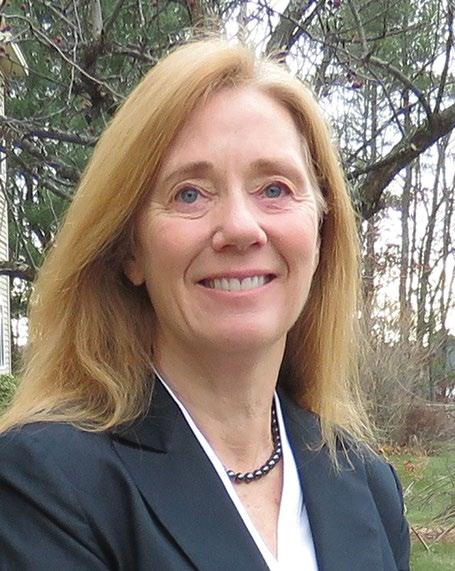
2 What is something you appreciate about Husson?
MICHAEL: From day one, your mentor and advisor tailors your coursework so that you have both general education courses as well as courses required for your major each semester. I also like that the advisors provide internships and other opportunities for us to experience entry-level responsibilities through management responsibilities by the time we graduate.
TAMERA: After an associate’s degree and a decade of administrative work, I knew I wanted more from my career. At Husson, I
Michael Sutton ’16G Vice President, Bangor Alumni Boardwas able to work part-time and complete my bachelor’s degree in two years at the Portland campus. The shorter semesters and flexible schedules allowed me to fit it all into my busy life. This allowed me to walk at graduation in Bangor when I was six-months pregnant with my first child.
3. Tell us about an individual or experience that made an impact on your time at Husson.
MICHAEL: Dr. Lee Speronis is the person who most impacted me during my time at Husson. Without him, I wouldn’t be where I am today. He took me under his wing from day one and ever since I left Husson, still manages to keep in touch with me. I value this as it shows me that he cares and wants to see the best in me. Students under his advisement have gone on to great things, in part because of his focus on making our education a positive
TAMERA: Returning to school as an adult was very different. The non-traditional culture contributed to my growth and maturity far beyond the classroom. The education was delivered by adults, to adults. The relationships with staff and fellow students impacted a growing period in my life, developing my self-confidence and career goals.
4. Why do you value serving on one of our Alumni Boards?
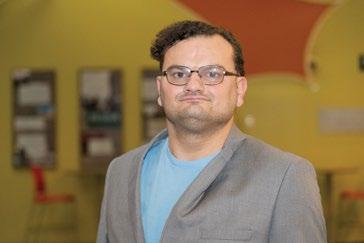




MICHAEL: It helps me stay connected to Husson even after leaving. It also helps me give insight to the students still here and to those who may express interest in being a Husson student. It’s sort of a passing of the torch. I want to continue to make the Husson experience a great one.

TAMERA: I joined the Southern Maine Alumni Board three years ago primarily as a career networking opportunity and quickly learned the value of alumni relationships in our lives. I enjoy our lively and diverse conversations and contributing to how we can engage alumni in ways to stay connected to Husson.
5. What do you like to do in your free time?
MICHAEL: I volunteer in the local community. Husson pays it forward in that regard by instilling a sense of community service in people. Also, I travel and spend time with friends and family, and have an amazing kitten that I care for.
TAMERA: Three words describe what I enjoy in my free time – be active, outdoors, and entertained. I run, hike, ski, paddle and sail, enjoying the treasures of Maine on the water and in the mountains. Add great food, music/theater with friends and family and I am at my happiest.
